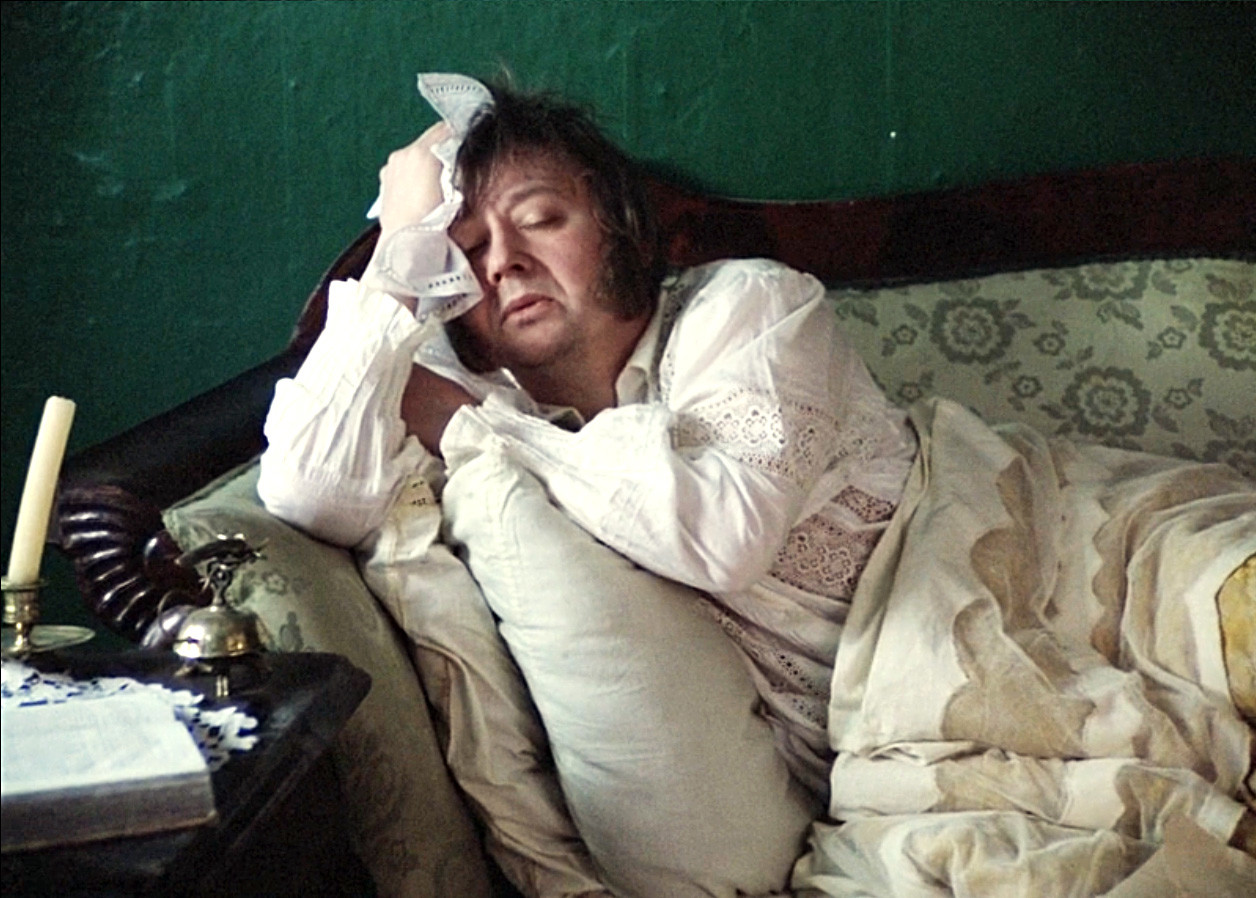
If you’re too lazy to read this classic of Russian literature about laziness, this film is for you. Oblomov is played by the talented Oleg Tabakov: Most of the movie he spends loafing around on the couch, until a woman transforms his life.
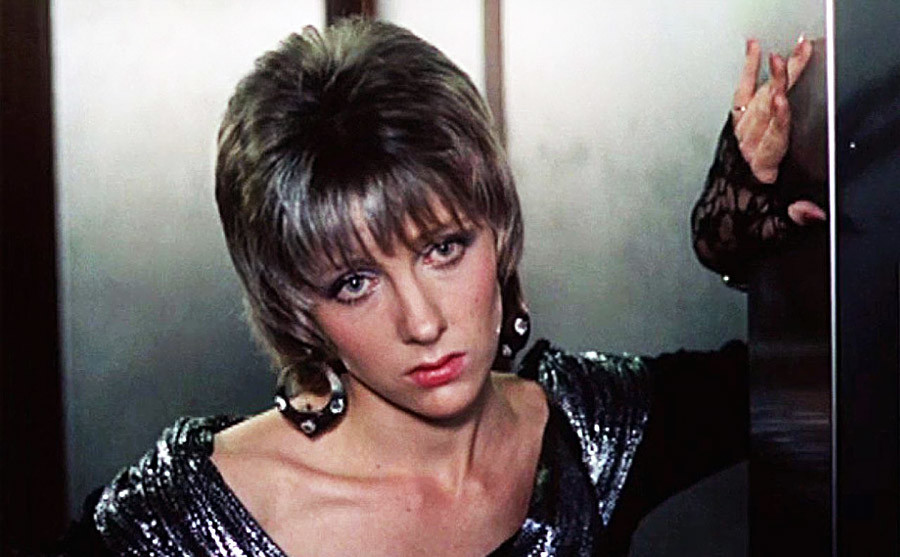
It’s difficult to imagine that this film was shot in the Soviet Union: hard-currency prostitutes, sex scenes, police brutality... For its time, the flick was a genuine movie revolution and earned itself a 16+ rating.
The plot revolves around a prostitute who dreams of finding a foreigner and going abroad. Having fulfilled her dream, the heroine feels alien and unwanted, but going back to the USSR is not an option...
Another film that shocked Soviet audiences in the perestroika years. And not without reason: it depicted the first sex scene in Russian cinema history. But the focus of the picture is a Turgenev-style intergenerational conflict.
Young Vera lives according to the laws of the new age, which her father cannot accept.
A little-known singer, already experiencing difficulties, becomes a single mother. But then her fortune changes, she wins fame and public adoration, yet this does not bring personal happiness. The film can be said to be a fictionalized biopic of the Soviet cult singer Alla Pugacheva, who essentially plays herself.
Lovers of Mad Max and the first Star Wars trilogy will be intrigued by this Soviet steampunk movie from director Georgy Daneliya: two random acquaintances find themselves in another galaxy, where they meet aliens who happen to have a spaceship.
On their quest to return to Earth, the pair experience all kinds of adventures. The only thing in their favor is that they have matches, which in this galaxy are worth their weight in gold...
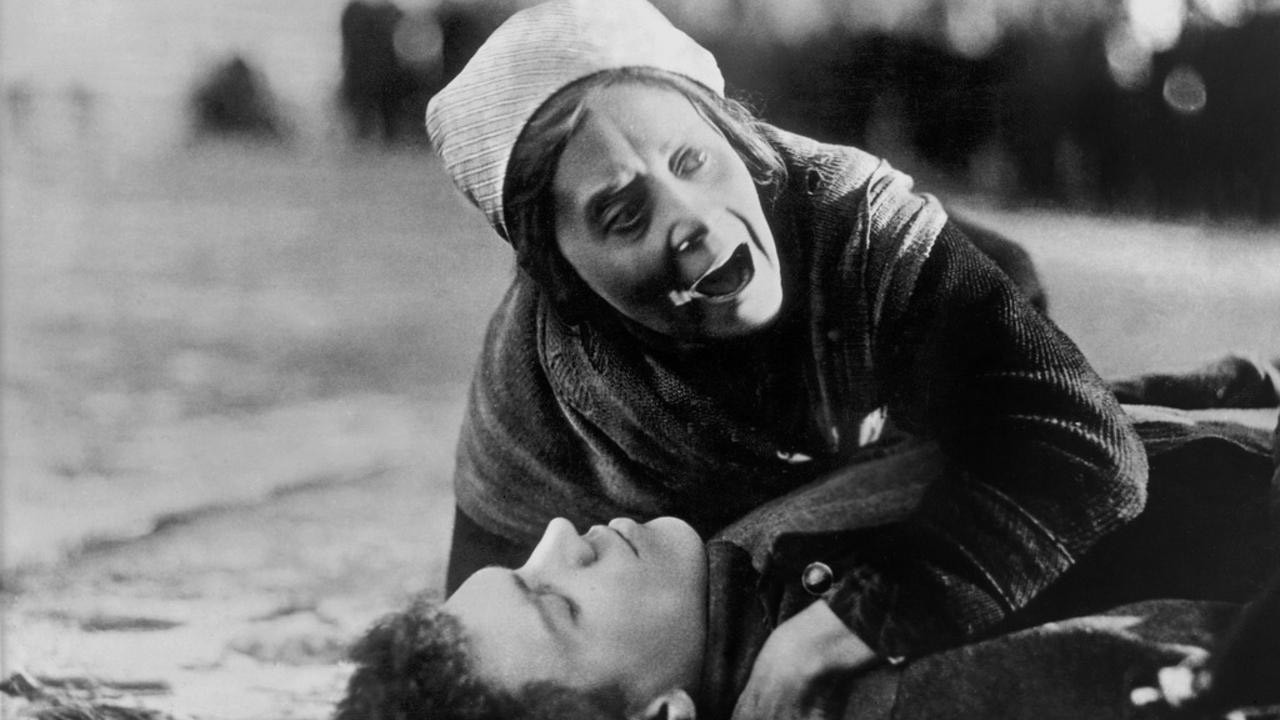
One of the first Soviet propaganda films. The film’s hero is a revolutionary worker, while its anti-hero is his alcoholic father who supports the tsar. This family drama was based on the eponymous novel by Maxim Gorky.
According to Serbian film-maker Emir Kusturica, this is one of the best movies in the world. It is the story of Romeo and Juliet set among the Hutsul tribes of Ukraine. According to contemporaries, the director used the film to depict a personal tragedy of his own not unlike the Shakespearian original.
Vertov was to film what Malevich was to art—a tireless experimenter determined to break free of theatricality. Together with cameraman Mikhail Kaufman, he brought the avant-garde to the silver screen, shifting the camera angles and employing “disruptive-associative montage” techniques. In this silent film, he captures real life: here there are no actors, no staged shots.
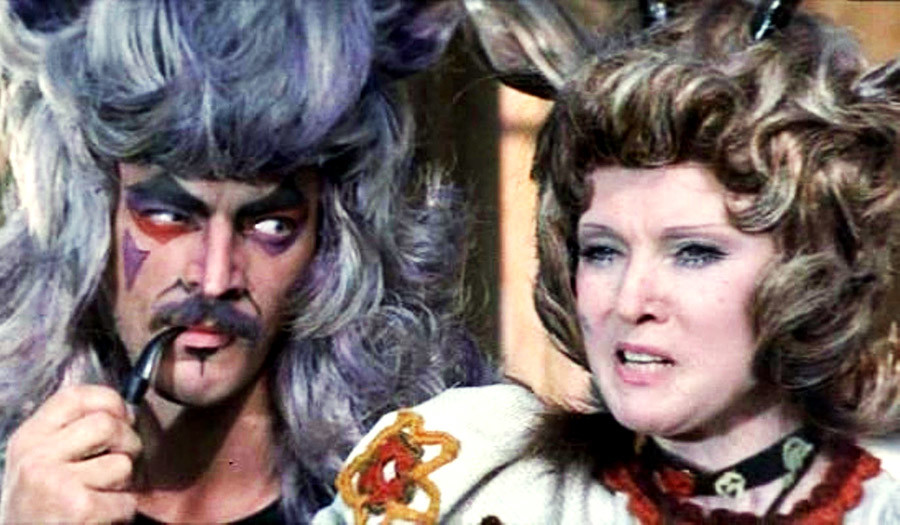
A slightly psychedelic film musical based on the fairytale The Wolf and the Seven Young Kids: a mother goat goes in search of food, leaving her kids (quite literally) at home. They are kidnapped (again quite literally) by a gray wolf who demands a ransom... This is one of the first Soviet film musicals, and its songs are loved by children and adults alike.
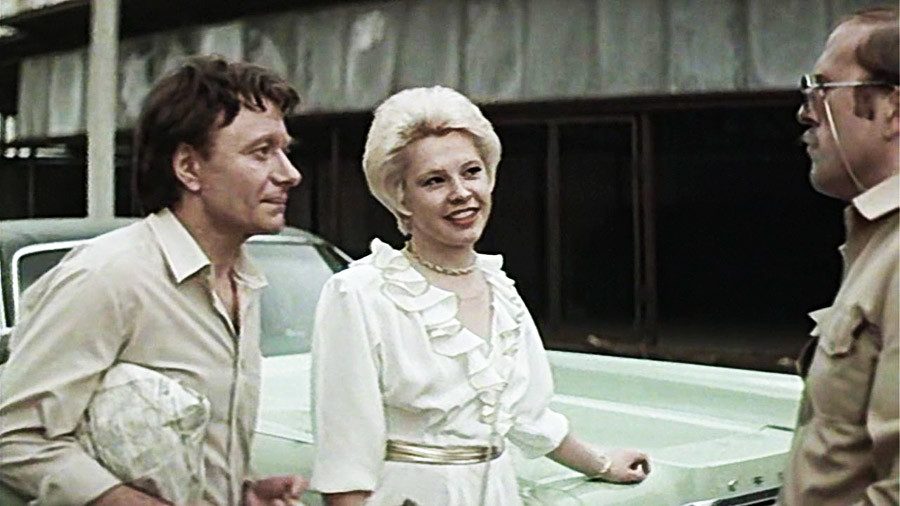
By Soviet standards, the blonde Nadezhda is a real go-getter. She knows where to get things that are in short supply, and is well connected and something of a VIP, since she works in a grocery store, which in the USSR is almost like being a factory boss.
Having fallen in love with a dreamy astrophysicist, she tries to remodel him, but he can think only of extraterrestrial civilizations. This is one of the last Soviet comedies, and a box office smash in its day.
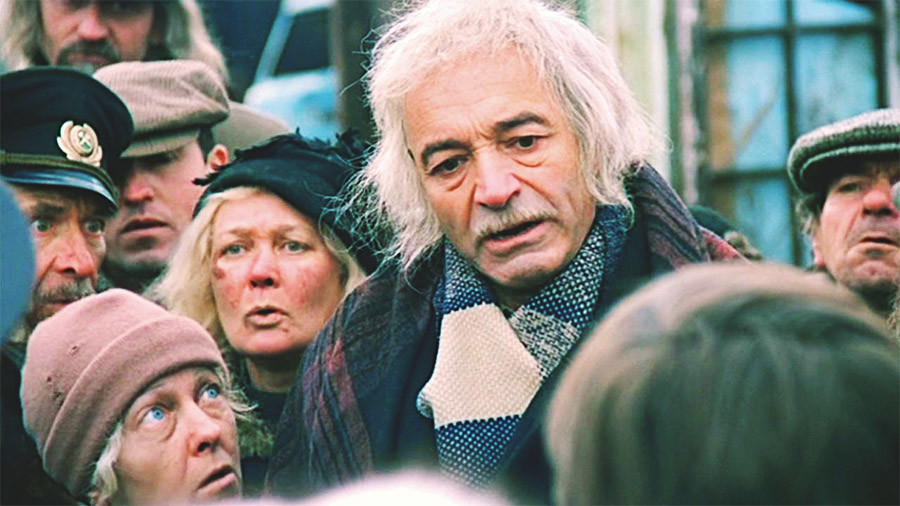
This is Maxim Gorky’s The Lower Depths in a tragicomic interpretation by the legendary Eldar Ryazanov. Homeless people live in a city dump, and, despite the threats from the authorities, do not want to leave the place they call home. So tanks are sent in to change their minds, but it no longer matters to them—they dream of ascending to a higher spiritual plain.
A Soviet film very much in the spirit of Woody Allen. Swindler and magician Count Cagliostro goes into hiding in the provinces after his latest scam is uncovered by an influential St. Petersburg prince. There, Cagliostro continues his jiggery-pokery, promising a young man in love with a statue to bring it to life; but the charlatan’s main goal is to unravel the formula of love, in order to further manipulate people.
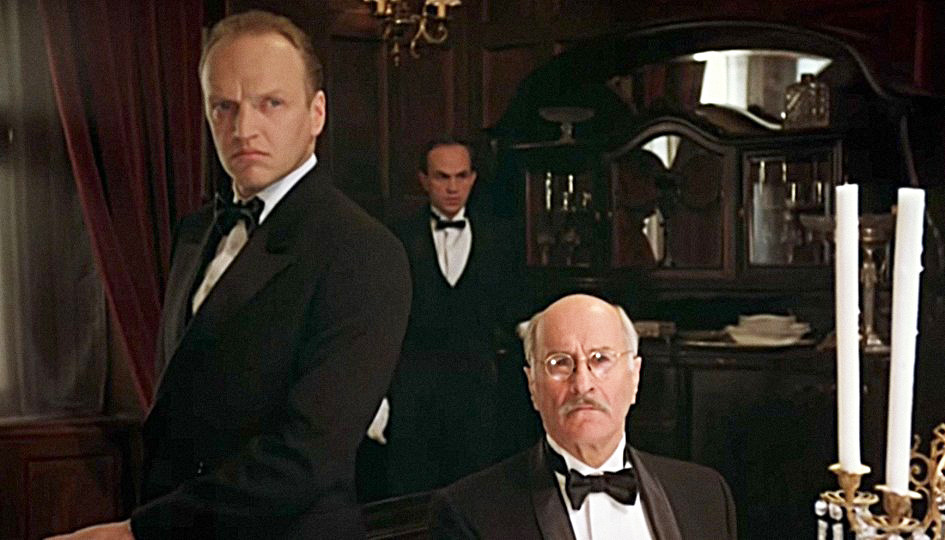
A popular screen version of a novel by queen of crime Agatha Christie. Ten strangers with no connection to one another arrive on a remote island at the invitation of the owner, who seems to be absent. One by one they come to a macabre end.
This spine-chilling tale was brilliantly played by a stellar cast of Russian actors. Incidentally, for reasons of political correctness, the title in English underwent various changes, and is today known as And Then There Were None.
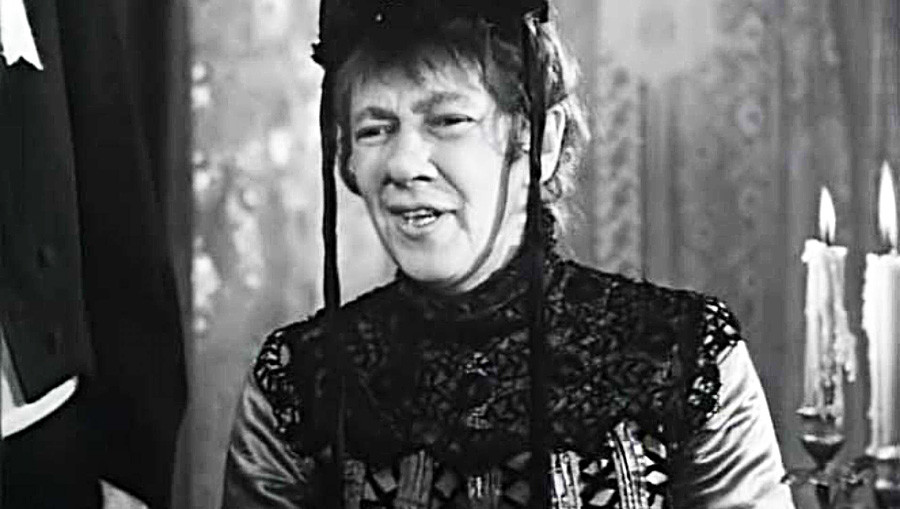
The virtuoso actress Faina Ranevskaya is remembered to this day for her razor-sharp, side-splitting phrases that have since become aphorisms. In this film based on stories by Chekhov, she plays the most frequent target of all Russian jokes—the mother-in-law. A very funny film about the pre-revolutionary petty bourgeois.
This historical film by the cult director and innovator Eisenstein, commissioned by the Soviet state, was intended to raise public morale and patriotic spirit.
The tight schedule meant that the large-scale Battle of the Ice scene, in which the knights were supposed to fall through a frozen lake, had to be shot in summer. The “ice” was asphalt sprinkled with salt and wooden boards painted white.
The sullen father of two boys returns home after several years’ absence. The boys do not know where he’s been and are very wary of him. As if nothing had happened, he takes his sons away from home on a trip...
Andrei Zvyagintsev’s first picture won him a Golden Lion at the Venice Film Festival and recognition as one of the most outstanding directors of modern times. The film also defined his directorial style—taciturn and savoring every frame.
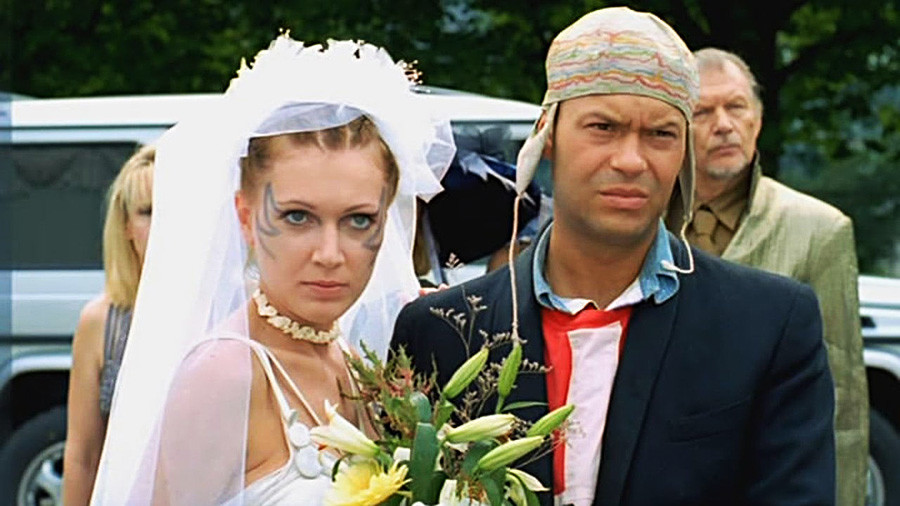
Programmer Myshkin returns from abroad. His big-shot companion Rogozhin talks about his new flame, a certain Nastasya Filippovna. Myshkin blindly falls in love with her image. This absurdist film is based on Dostoevsky’s novel The Idiot, set in “wild 90s” Russia.
A tale about Soviet rock-and-rollers, who illegally buy foreign fashion items, listen to banned Western music, dance boogie-woogie, and, of course, fall in love.
Their underground get-togethers are dispersed by voluntary units of diehard communists, and they are condemned at party meetings. Todorovsky’s nostalgic film musical performed well at the box office on release.
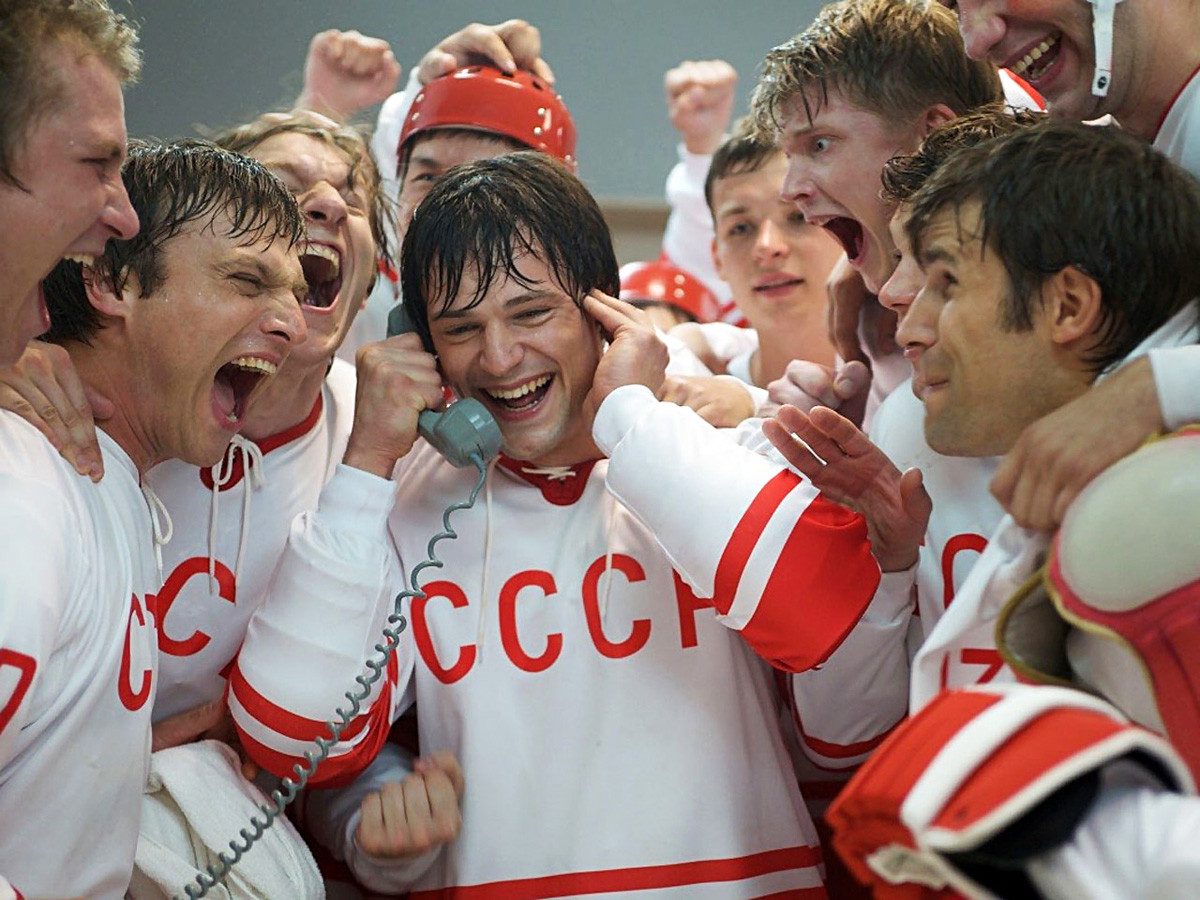
This biopic of famous Soviet hockey player Valery Kharlamov traces his rise to glory from a provincial Urals club to CSKA Moscow and the USSR’s demolition of Canada in the first game of the 1972 Summit Series. It stars sex symbol and Russia’s most in-demand young actor Danila Kozlovsky.
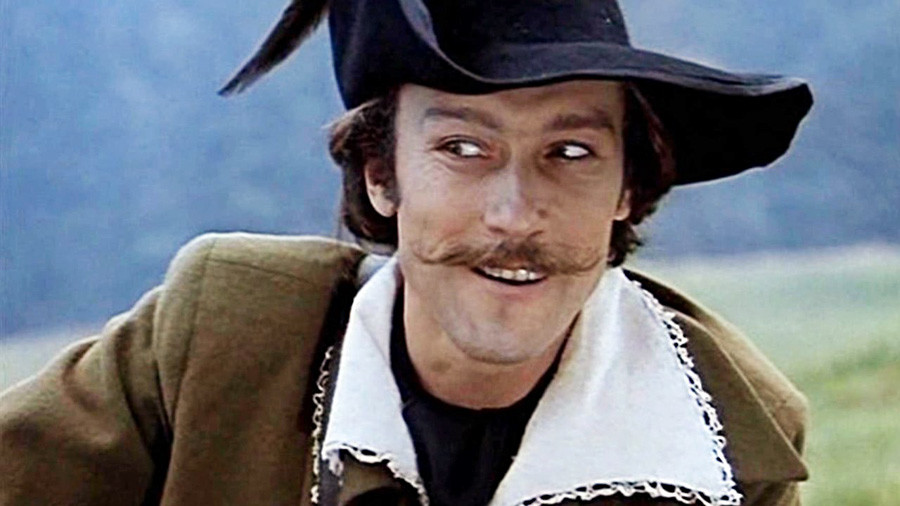
This film was born from a play staged at the Moscow Lenkom Theater, with the screenplay by dramatist Grigory Gorin. Like the original character, Baron Munchhausen is full of incredible stories, but his fiancée wants him to stop spinning ludicrous yarns. He gradually become more serious, but nevertheless decides to “repeat” his journey to the moon. A crowd gathers to watch the firing of the human cannonball...
If the film Hachiko made you shed a tear, you’ll need a bucket for White Bim, as two generations of Russians have already found out. Bim, a Gordon Setter puppy with one black ear, lives with hunter Ivan Ivanovich. When his owner ends up in the hospital, Bim goes in search of him...
This film about Russia’s most notorious medieval tsar was another one tasked with raising the public’s patriotic spirit, while simultaneously justifying the iron rule of the “father of nations” Joseph Stalin (who was reportedly an admirer of Ivan the Terrible).
The film was commissioned by the state during the Great Patriotic War, and many of the actors were suffering from hunger. Three parts were initially planned, but Eisenstein died, leaving only two.
A musical comedy about a competition between two collective farms as they prepare for a fair. The post-war hunger is glossed over, with the film showing an abundance of food and merrymaking.
Pyryev was a director at the Mosfilm studio, before serving for more than a decade as chairman of the USSR State Committee for Cinematographers. In that capacity, he was essentially the country’s chief censor, and from the viewpoint of Soviet ideology his film was nothing if not exemplary.
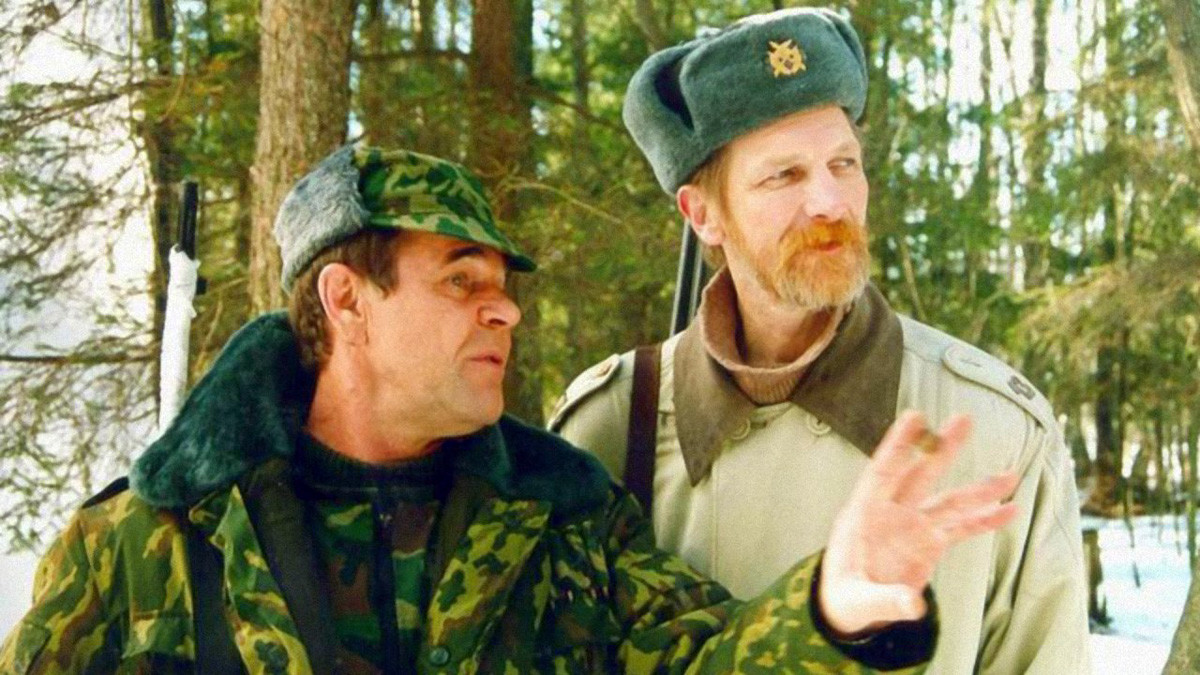
A foreigner visits Russia to study the national customs and traditions, and gets more than he bargained for. What starts off as a hunt descends into mayhem with more than a few crates of vodka along the way.
The comedy regularly reduces Russians to tears of laughter (or otherwise), because they recognize themselves only too well in these outlandish escapades.
A psychologist arrives at the Solaris space station and discovers strange goings-on: all the scientists on board are suffering from some kind of mental illness. The psychologist too starts seeing hallucinations in the form of his dead wife. Tarkovsky’s sci-fi drama was adapted for screen from the novel by Polish writer Stanislav Lem, and it still inspires many filmmakers and artists to this day.
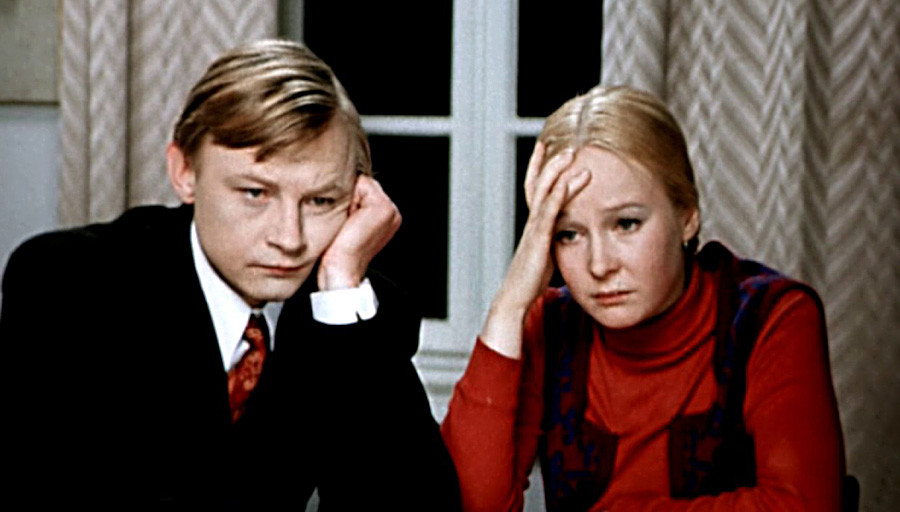
An implausibly kind-hearted four-part film about a night school for young workers. History teacher Nestor, fresh out of college and with a name like a medieval chronicler, has to cope with a very difficult, but highly talented class in which many students are much older and more experienced
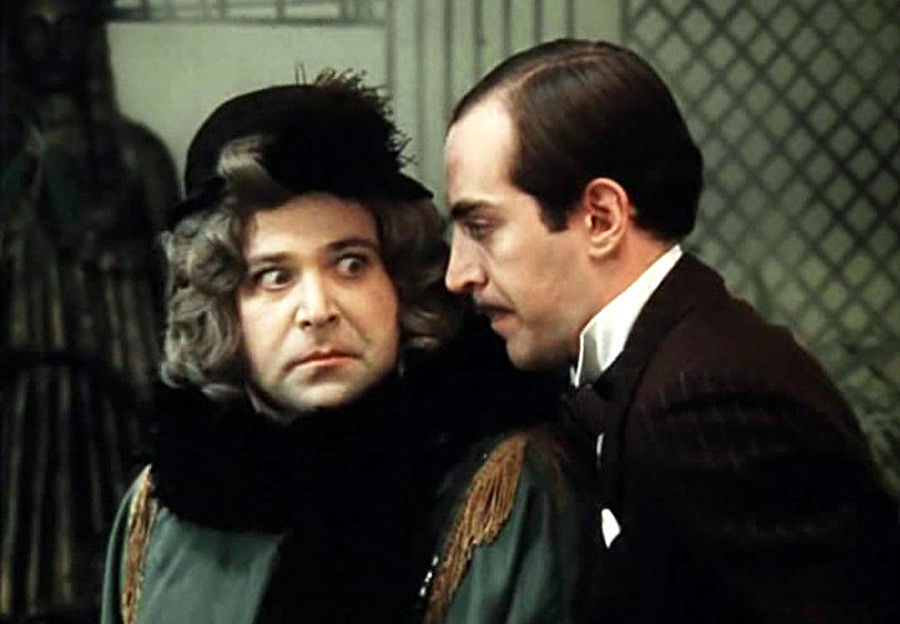
Soviet directors loved bringing English classics to the screen, but this film version of Brandon Thomas’s Charley’s Aunt is still the one to beat. This comedy farce, in which the hero hides from the police by pretending to be the rich “Donna Lucia” from Brazil, employs a now standard plot device—the “donna” is
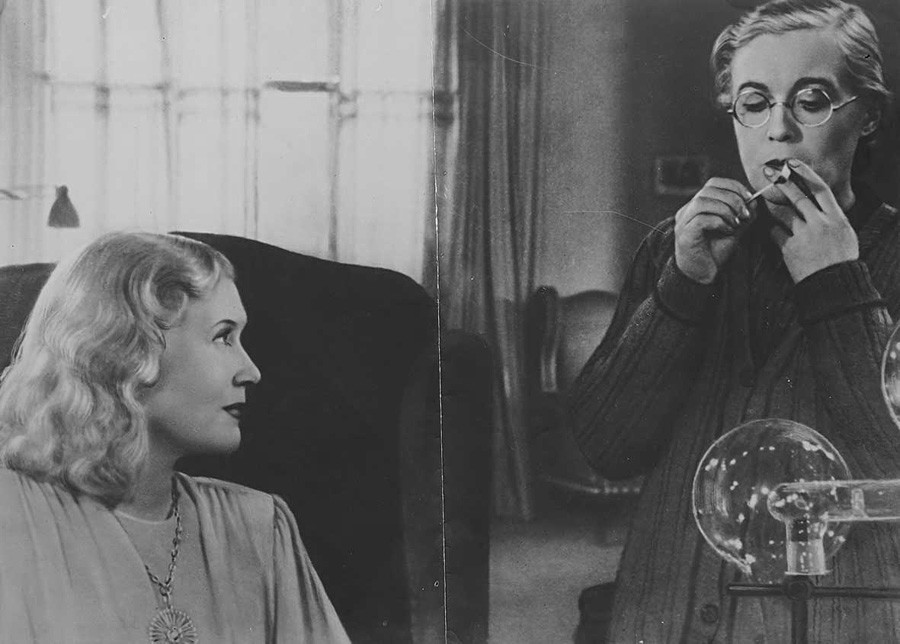
An operetta actress is asked to play the role of a scientist in a new film. But the theater and cinema rehearsal times clash, and she can’t be in two places at once. Luckily, she manages to find a real-life scientist who looks just like her. The actress persuades the highbrow scientist to replace her on the set...
Both roles are played by the people’s darling Lyubov Orlova, who gave frontline performances for soldiers during the Great Patriotic War.
This Russian version of Pinocchio is one of the most beloved tales of Soviet children. The movie’s original soundtrack was voted into the Golden Fund of Russian Film Music.
The Soviet-Afghan war has long been a sore spot in Russia, which is why there are so few films about it. But that didn’t deter director Fedor Bondarchuk, who made a gut-wrenching blockbuster in the spirit of U.S. films about Vietnam.
This Soviet-Japanese coproduction, directed by Japan’s Akira Kurosawa and shot in Russian, won an Oscar for best foreign film. The film is based on the autobiography of Far East explorer Vladimir Arsenyev. On his expeditions, he was assisted by hunter Dersu Uzala, a native of the Ussuri region, who knew the terrain like the back of his hand and what to do if a tiger got too close.
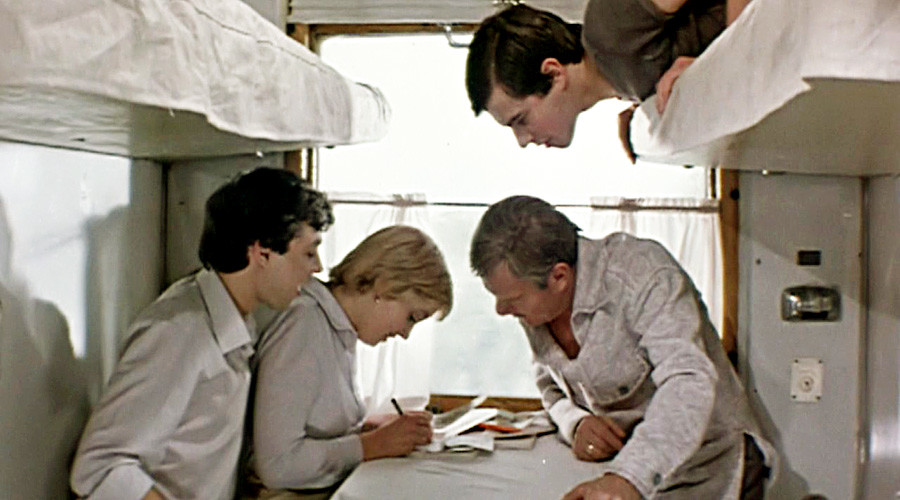
A comedy about a pair of speculators who go in search of a winning lottery ticket. The film topped the Soviet box office in 1982 with 55 million viewers. One of the best comedy duos in the USSR, actors Kokshenov and Pugovkin have been making audiences chuckle for more than 30 years.
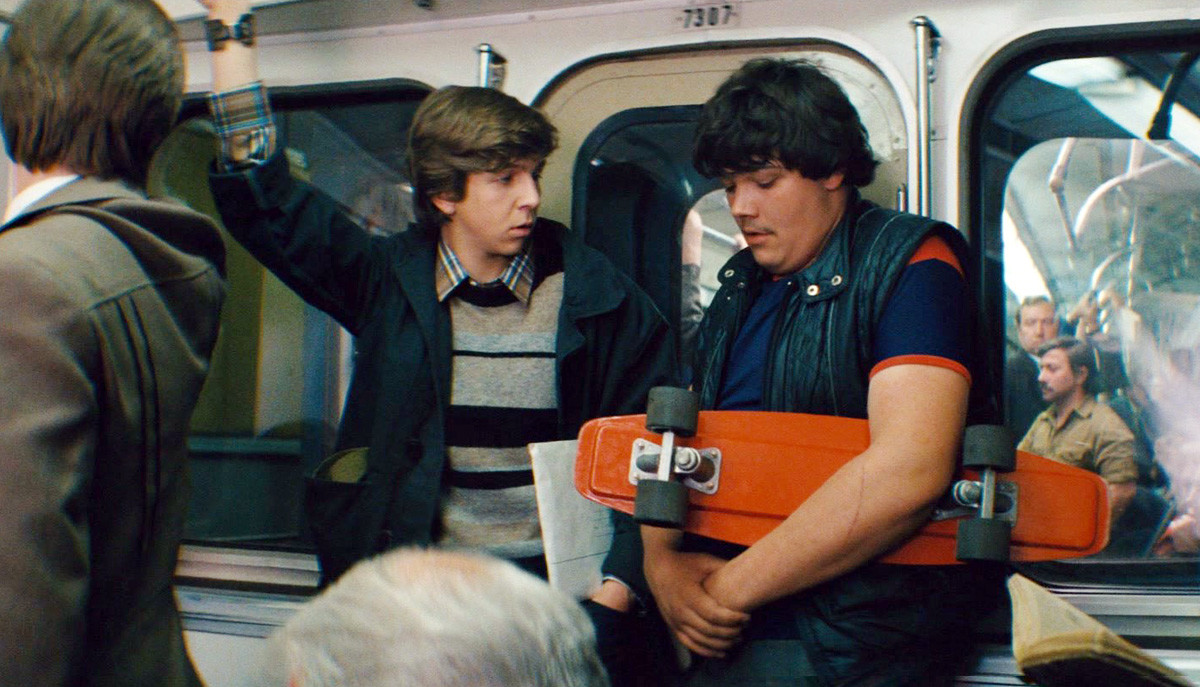
A young boy, on failing to enter college, gets a job as a courier and starts an affair with a professor’s daughter. The girl’s father is less than thrilled by her choice, made worse by the guy’s decision to tease the old man by alleging that his daughter is pregnant. Another perestroika film that vividly depicts the new era and even the first Soviet break-dance.
A sumptuous saga about a young cadet in Tsarist Russia. He falls in love with a daring American lady, and is ready to do anything to defend her and his own honor. It features Russian actor Oleg Menshikov with Hollywood star Julia Ormond.
The film is also famous for then-President Boris Yeltsin allowing the illuminated Kremlin stars to be turned off for the first time since the Great Patriotic War.

This romantic story set in summertime St. Petersburg was a true cinematic event in 2006, despite the no-frills plot. Masha, a young woman, loses her mobile phone. It is found by Maxim, who wants to return it. But try as they might, the couple are fated not to meet, always missing each other by a split second. Long chats over the phone inevitably lead to deeper feelings.
Don’t be put off by the title. The debut film of director Alexander Khant has a meaty plot and some real folk heroes. In this adventure road movie, lowlife Vitka discovers that he has a criminal father who is now disabled. He can get his father’s apartment if only he can put him in a nursing home...
A documentary film by avant-garde filmmaker Vertov about a day in the life of the young Soviet Union: cars and buses trundle along, workers toil away in factories, pedestrians hurry by. It also features a wedding, childbirth, and a funeral, all filmed using the ground-breaking techniques of the legendary director.
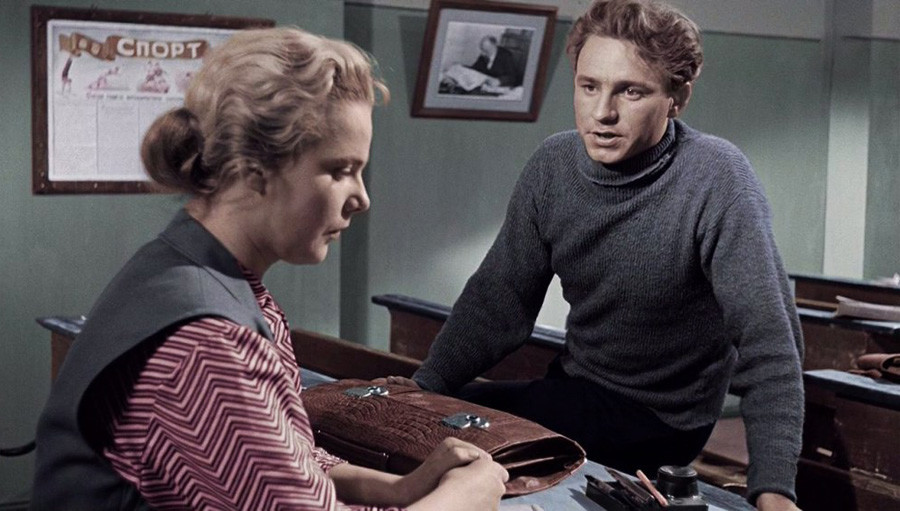
A cinematic symbol of the time of the “Khrushchev thaw.” A shock-worker at a metallurgical plant attends evening classes and falls in love with his young teacher, who has just graduated from college. Both are proud, principled Soviet people, and their relationship is a rocky ride.
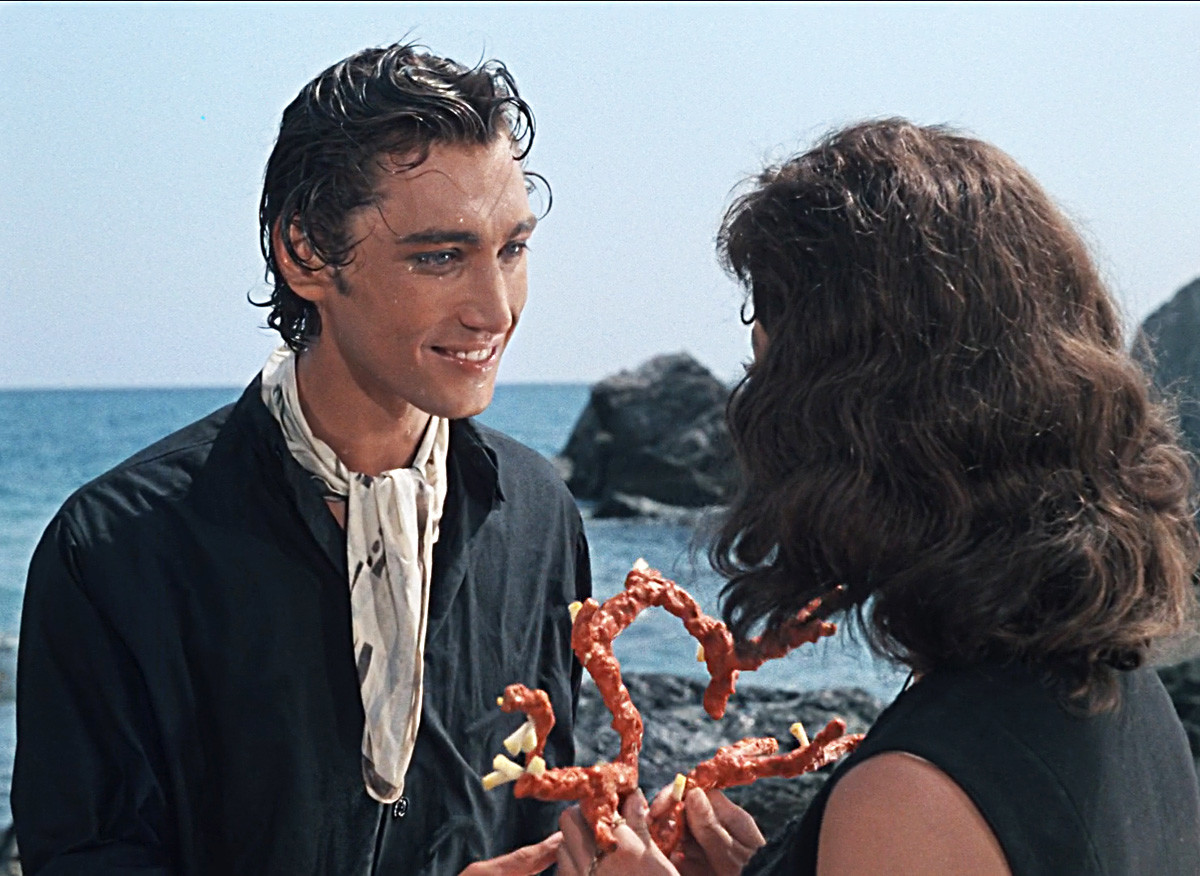
The Oscar-winning The Shape of Water fades in comparison with this Soviet adaptation of the sci-fi novel by Alexander Belyaev, also called Amphibian Man.
Instead of a green monster, Vladimir Korenev plays the role of Ichthyander, a handsome youth surgically altered to survive under the sea. There, he lives with his dolphin friends, until one day by chance he rescues a beautiful girl from drowning. Now he wants to become a normal human being, but, alas, he cannot live long without water.
Eight cinematic novellas tell about the life of the ancient Russian monk and icon painter Andrei Rublev. He observes the cruel, bloody, soulless Russian Middle Ages full of wandering minstrels, pagans, holy fools, and devastating Mongol raids. Tarkovsky’s masterpiece is highly rated abroad, too, and regularly appears in Top 100 lists of the best films ever made in any language.
Although few modern viewers would voluntarily sit through this epic, it is rightly included in all textbooks on the history of cinema. Legendary director Sergei Eisenstein shows events from the first Russian revolution of 1905: sailors aboard the Potemkin refuse to eat maggot-infested meat and mutiny against their commanding officers. One of the most memorable scenes of the film—the much-imitated (and parodied) Odessa steps sequence—is perhaps the most recognizable moment in world cinema.
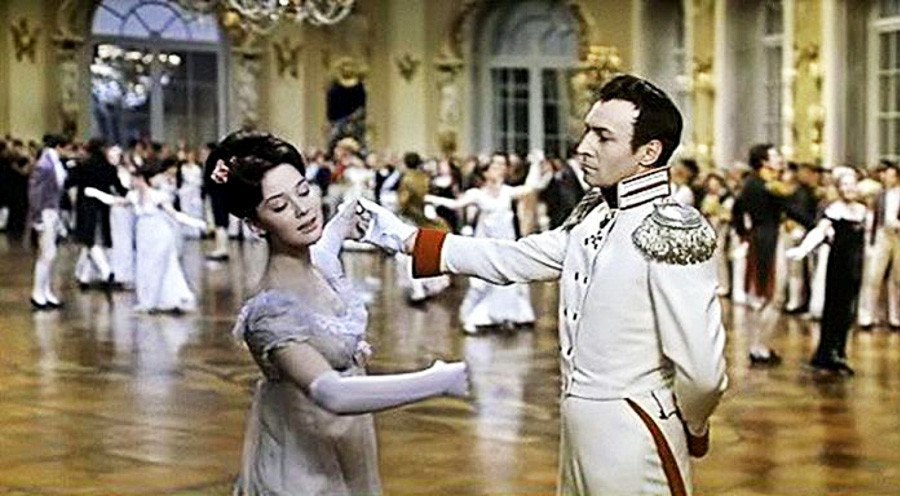
This story of several families in Russia set against the backdrop of the Napoleonic Wars from 1805 to 1812 won an Oscar for best foreign film. Critics consider it to be the best adaptation of Leo Tolstoy's epic. The roles of Andrei Bolkonsky and Anatol Kuragin were played by Soviet sex symbols Vyacheslav Tikhonov and Vasily Lanovoy.
Spend a whole weekend relishing this glorious moving canvas (four films in total), and then compare it with the recent BBC series.
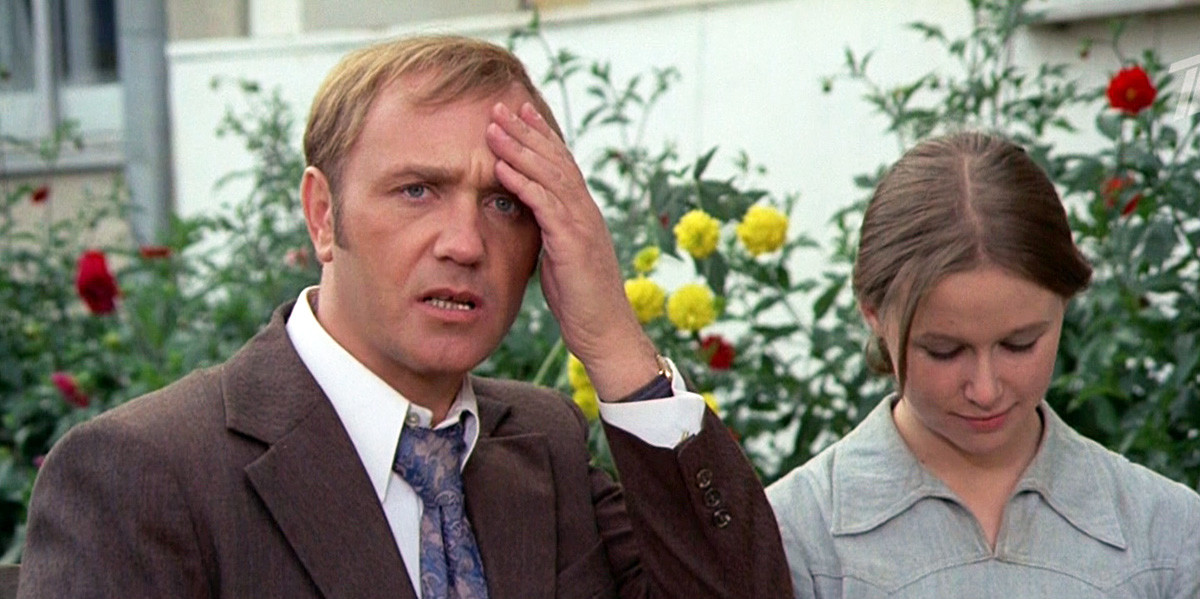
Poor, lonely plumber Afonya is a shoddy worker and full-time alcoholic. He is reprimanded by his superiors and threatened with dismissal, but that has little effect. Only Katya, a woman he meets, believes that he can change...
This comedy about a simple Russian guy won viewers’ hearts and minds with its recognizable characters and sharp dialogue.
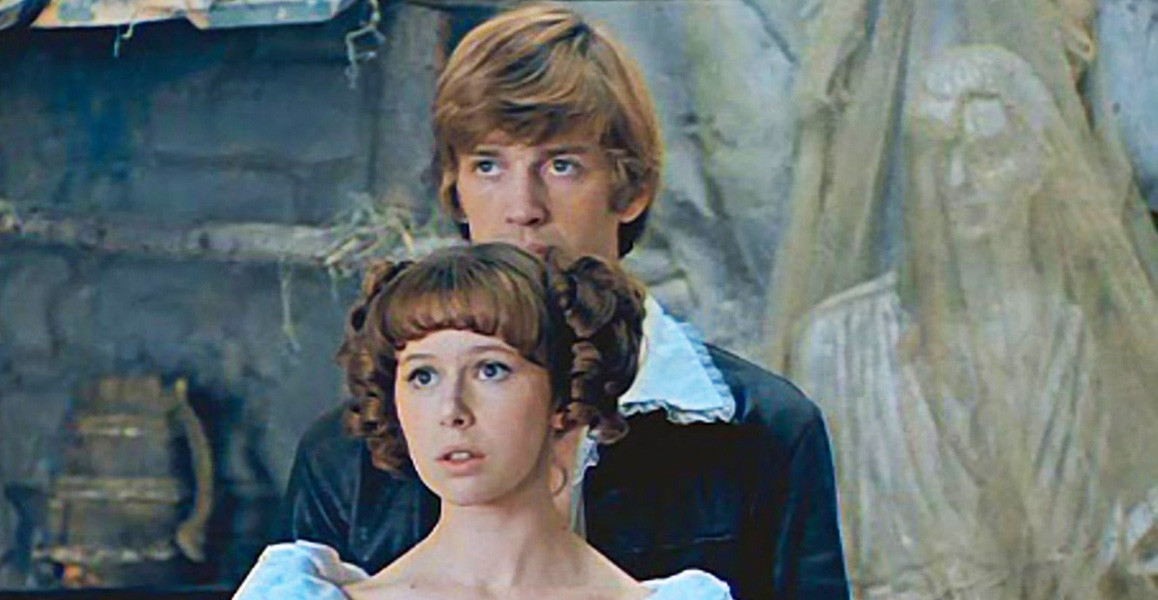
The film, based on the play by Evgeny Schwartz, tells the story of a bear transformed into a youth through witchcraft. If he kisses the princess, he will turn back into a beast, but he wants to remain human...
This beloved Soviet fairytale for adults was first shown on January 1, the day when many hope for a new life and an ordinary miracle. That’s probably why it’s still popular today.
A high school student becomes a religious fanatic, and takes everything he hears and reads horribly literally. He forces others to live by his dogmas, with disastrous consequences.
Made by renowned theater and film director Kirill Serebrennikov, the film developed out of his successful stage production at the Moscow Gogol Center. It received several awards at international film festivals, including Cannes.
One of Zvyagintsev’s best-known films, shot in the tiny village of Teriberka in the Murmansk region in northern Russia, has become a mecca for novice art-house directors. This drama about the helplessness of the individual in the face of the state machine was awarded a Golden Globe and nominated for an Oscar.
This gripping tale about a simple guy by the name of Anton who accidentally violates the centuries-old truce between the forces of dark and light, was one of the first Russian blockbusters.
The film, shot by renowned director Timur Bekmambetov, who is also quite active in Hollywood, is a screen version of Sergei Lukyanenko’s sci-fi novel of the same name (and don’t forget the sequel Day Watch).
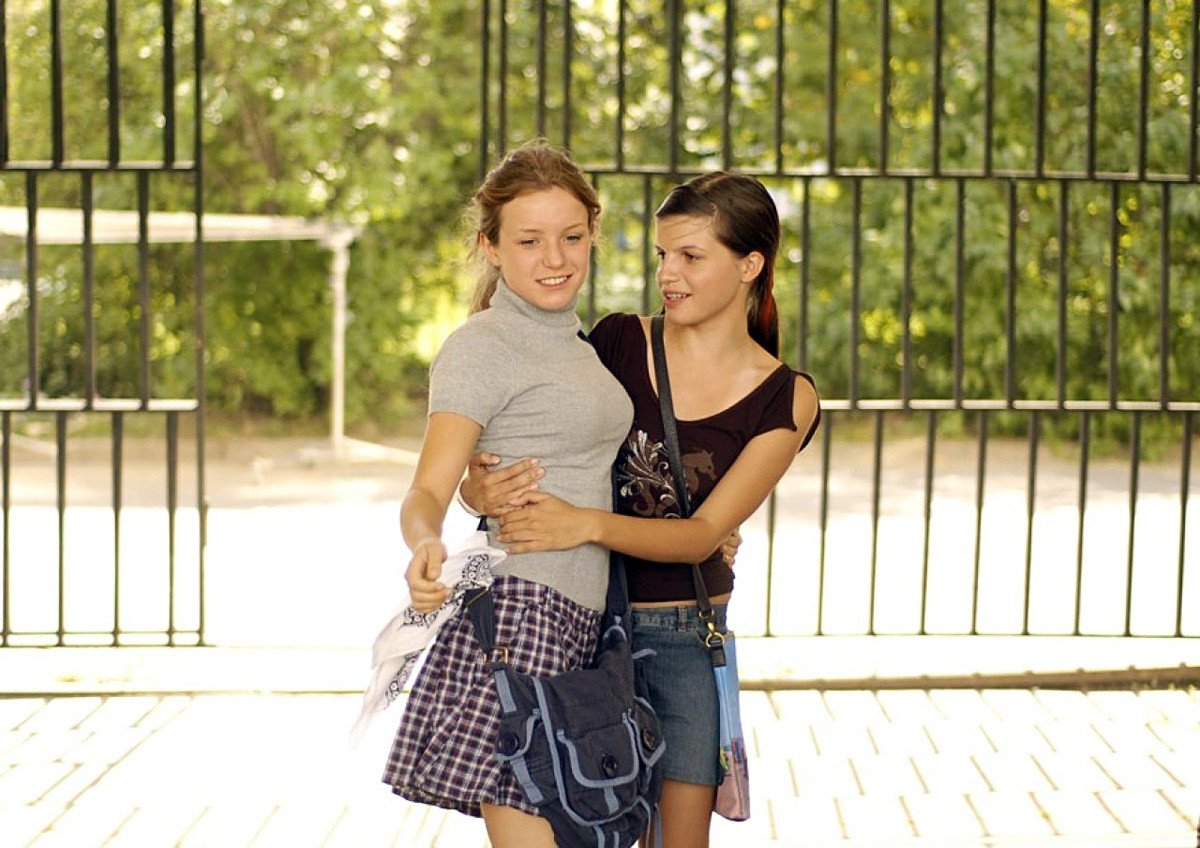
This coming-of-age drama went down a storm when it debuted at Cannes. The film made 24-year-old Valeriya a star, although it remains her only notable cinematic work to date.
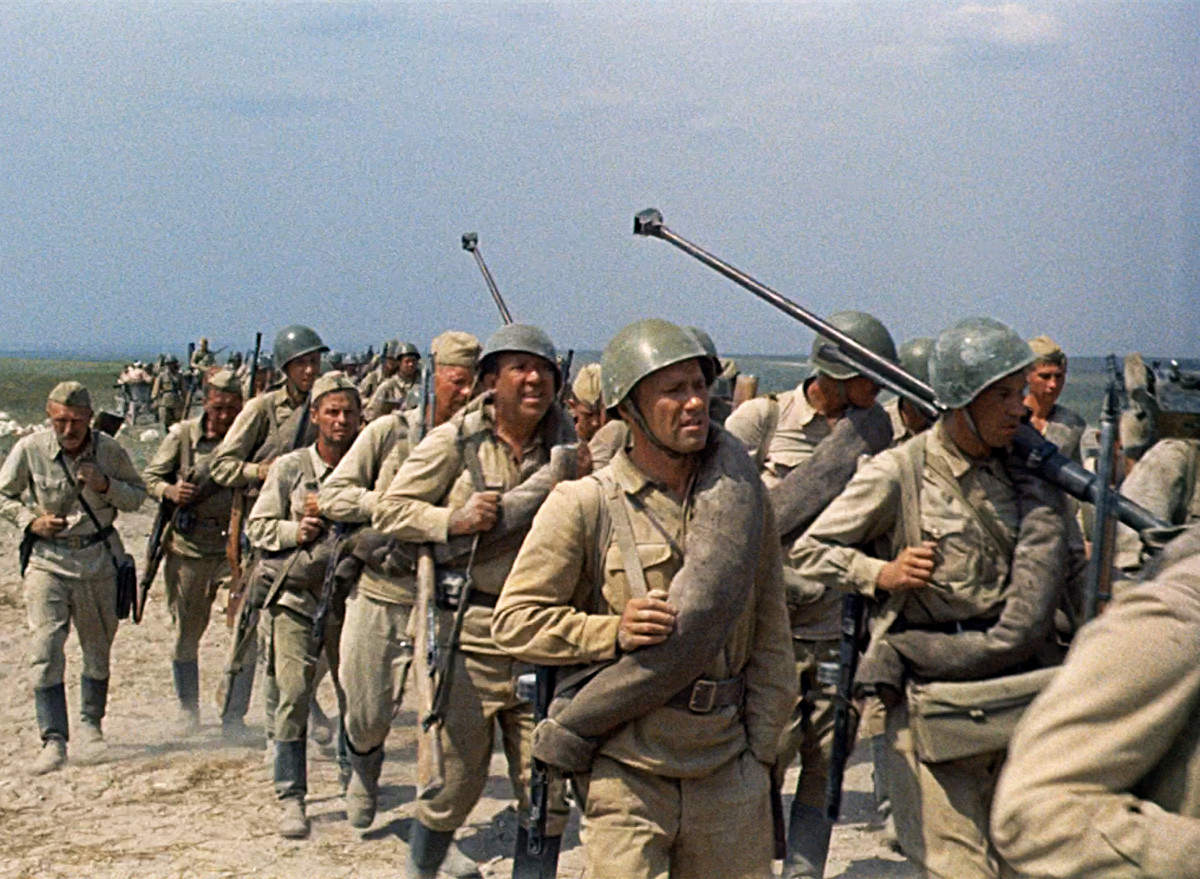
This screen adaptation of the eponymous novel by Mikhail Sholokhov was made by Oscar-winner Bondarchuk. Timed to coincide with the 30th anniversary of Victory Day, it tells about the exploits of Soviet troops during the Second World War and is acknowledged as a classic of the genre.
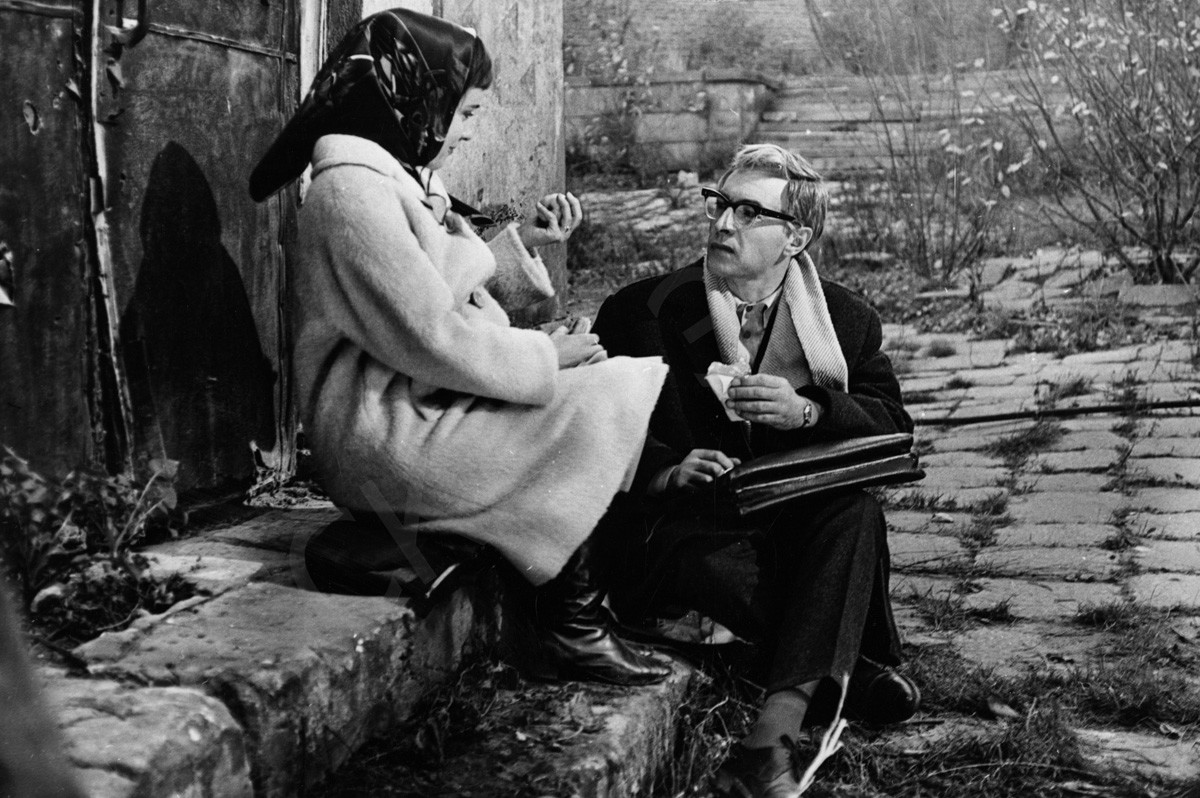
The film depicts three days in the life of an ordinary Soviet school against the backdrop of a love story between a new, young female teacher and an older colleague. The picture was recognized as the best film of the year, and won the main prize at the Moscow Film Festival and even a USSR State Award.
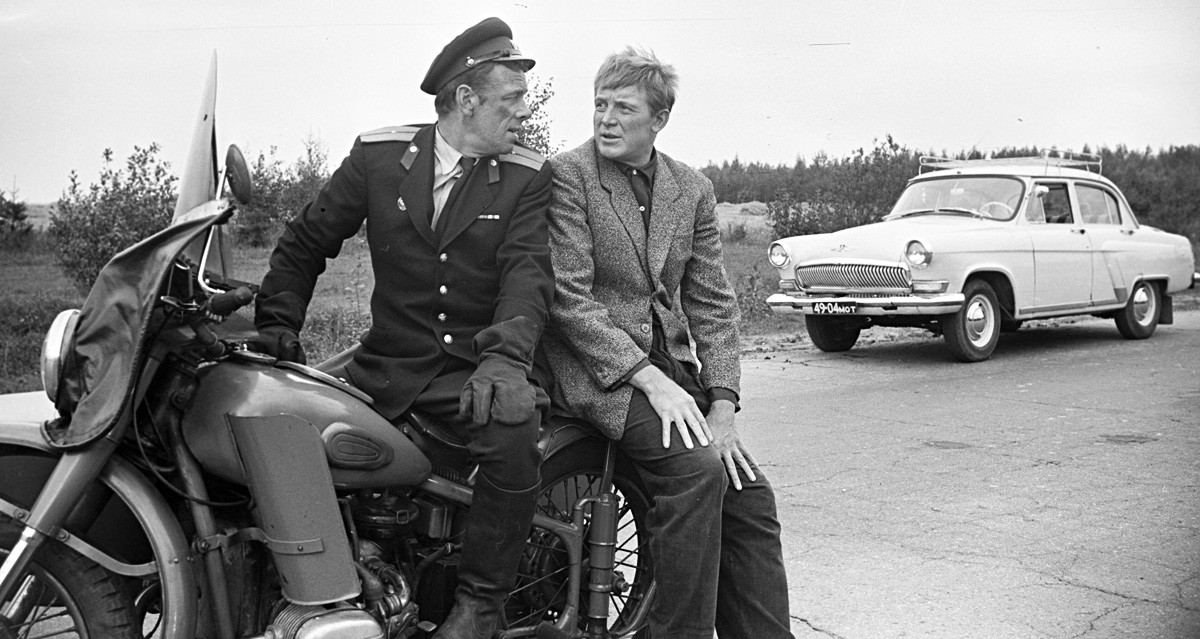
Yuri Detochkin is a Soviet Robin Hood. He steals cars from the rich, sells them, and gives the money to orphanages. An investigator uncovers the crime, but on learning about Detochkin’s noble aims finds himself unable to arrest the thief.
One of the most popular Soviet films, it was intended to depict the ideal Soviet citizen, for whom conscience and social equality are paramount.
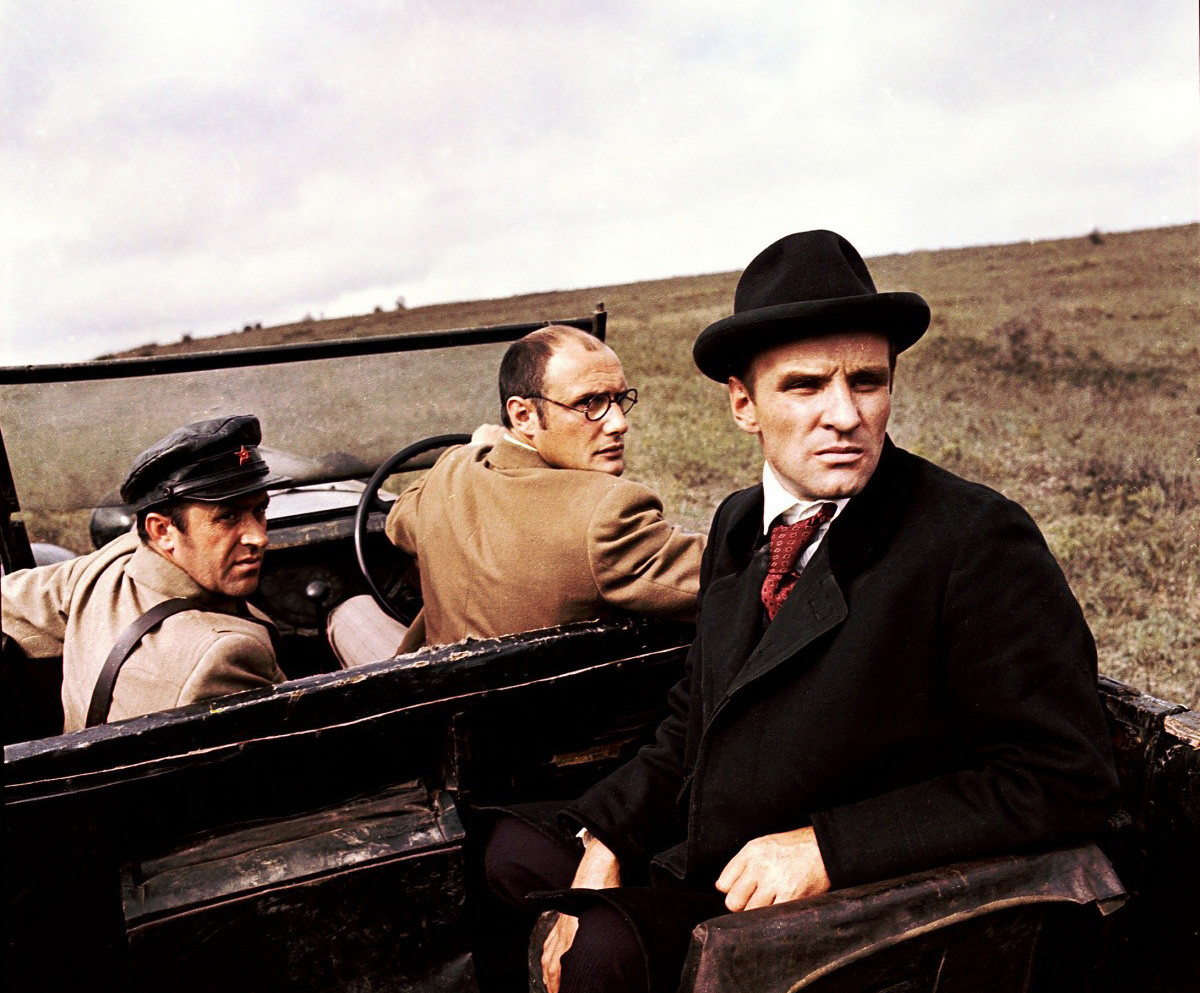
An “
Nikita Mikhalkov’s directorial debut is considered a movie classic. It was shown at several international festivals.
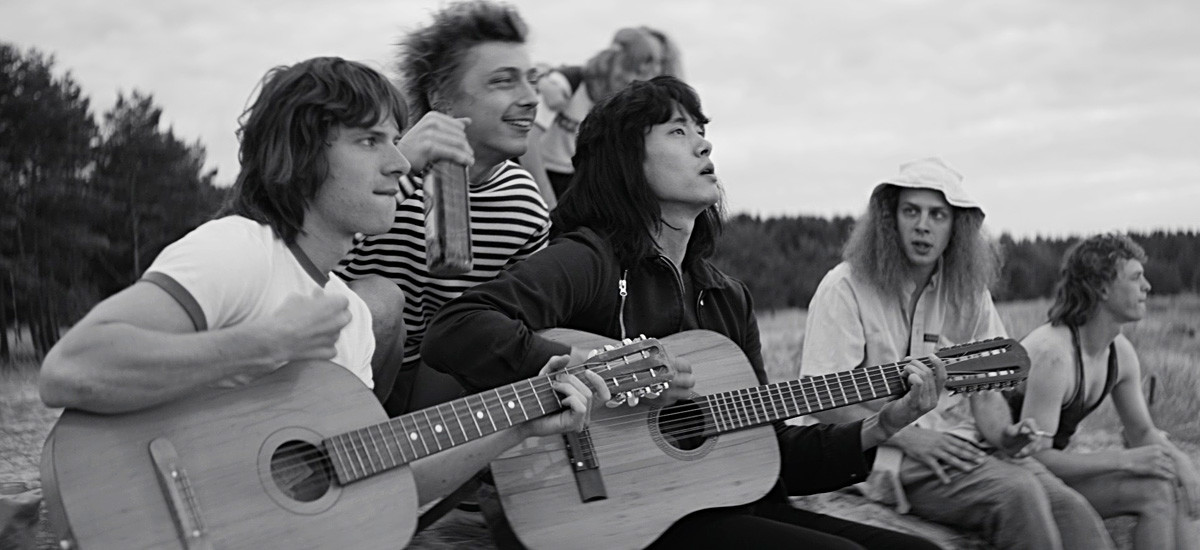
A biopic of cult rocker Viktor Tsoi and Soviet underground culture. The film won a Cannes prize for best soundtrack. The drama on screen was matched by the drama off it—director Kirill Serebrennikov finished work on the film while under house arrest on charges of embezzlement.
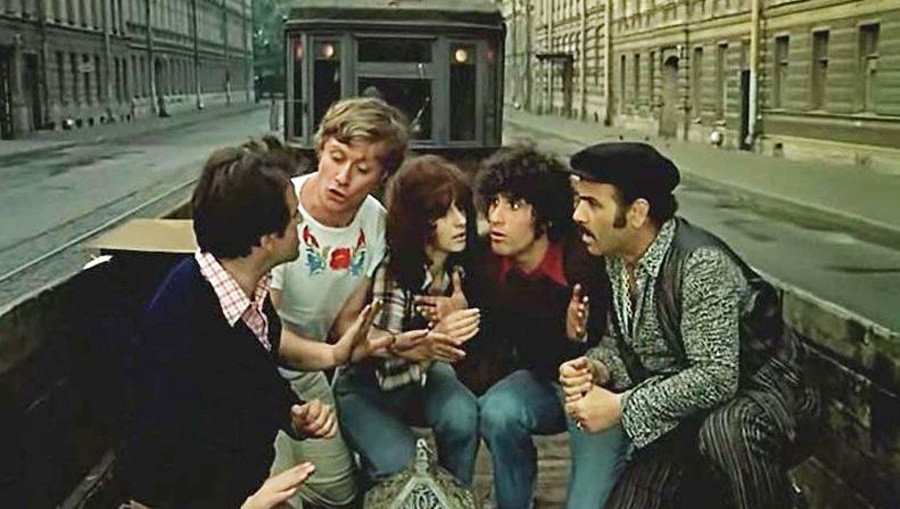
It turns out that St. Petersburg is home to a huge number of lion statues. To find the one with treasure buried underneath, Italian crooks dig under all of them in turn. The blame for everything lies with an elderly Russian émigré who hid treasure under a lion during the revolution.
The film features many special effects, not inferior to Hollywood for the time, including a gas station explosion and a car chase. Without stunt doubles, the actors themselves jumped over a moveable bridge in St. Petersburg and clambered out the window of a multistory building down knotted bed sheets.
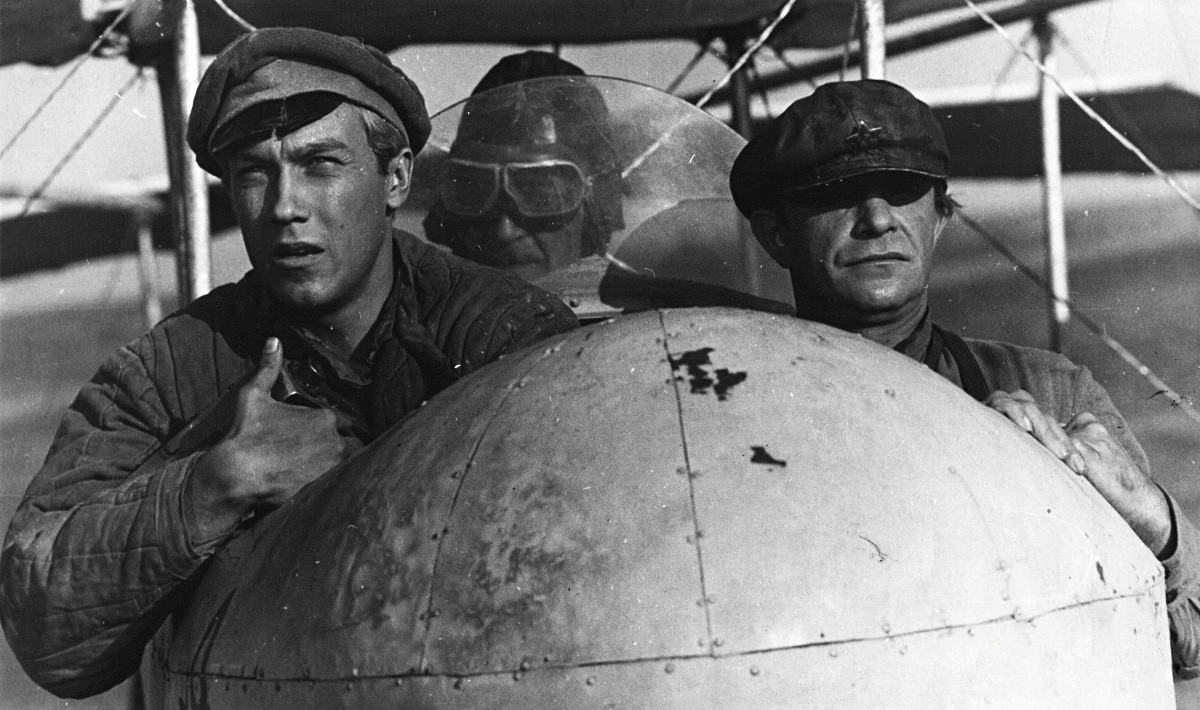
One of the finest films about the Russian Civil War, which even history teachers advise watching. A detachment of White Guards is surrounded in Crimea by the Red Army. The commander instructs two Red Army soldiers to film the location of the Whites on a movie camera from the air (a difficult technological feat at the time of the Civil War), but their plane falls from the sky and they are captured...
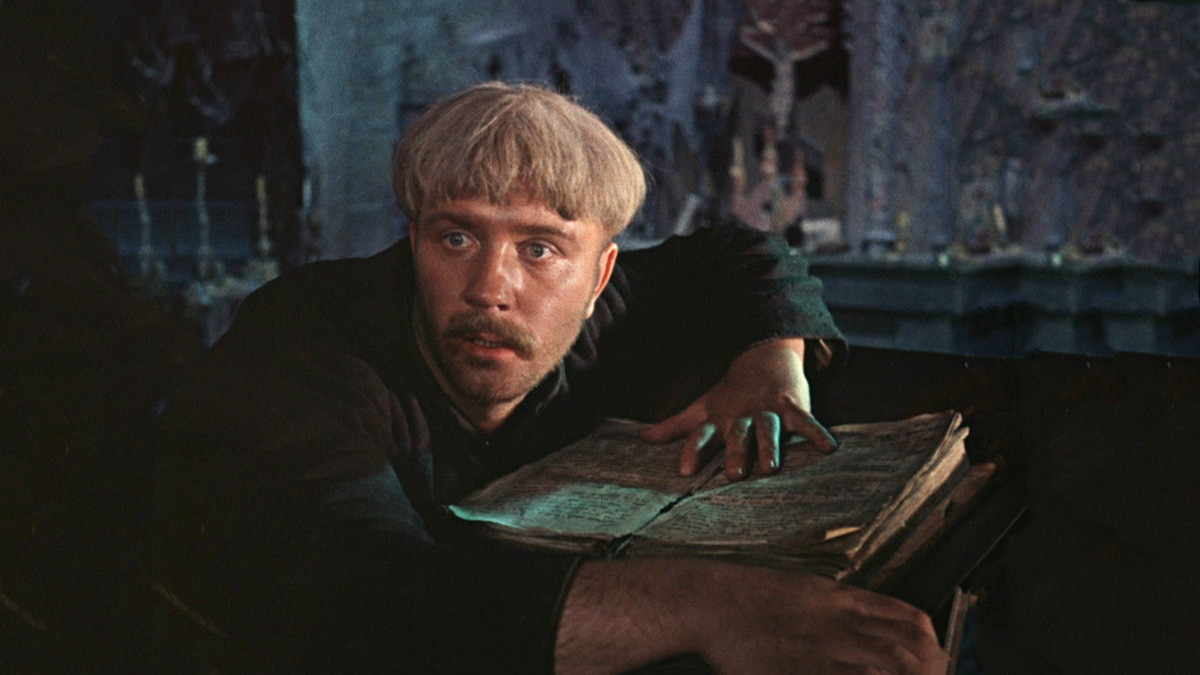
Soviet horror films can be counted on the fingers of one hand. But watching Viy, you risk turning gray, just like the character at the end of the movie. It is based on the story by Nikolai Gogol, in which a seminary student is sent to read night prayers over the body of a beautiful deceased girl. Spoiler alert: The girl turns out to be a witch, and rises from the grave on the very first night.
Two lovebirds stroll around Moscow until late at night, and in the morning discover that the Soviet Union is at war. The young man is called up for frontline service, while his girlfriend remains in Moscow and ends up marrying another man.
The film is not recommended to those of an overly sensitive disposition. The jury at Cannes in 1958 sobbed so much that they awarded it the festival’s highest award, the Palme d’Or.
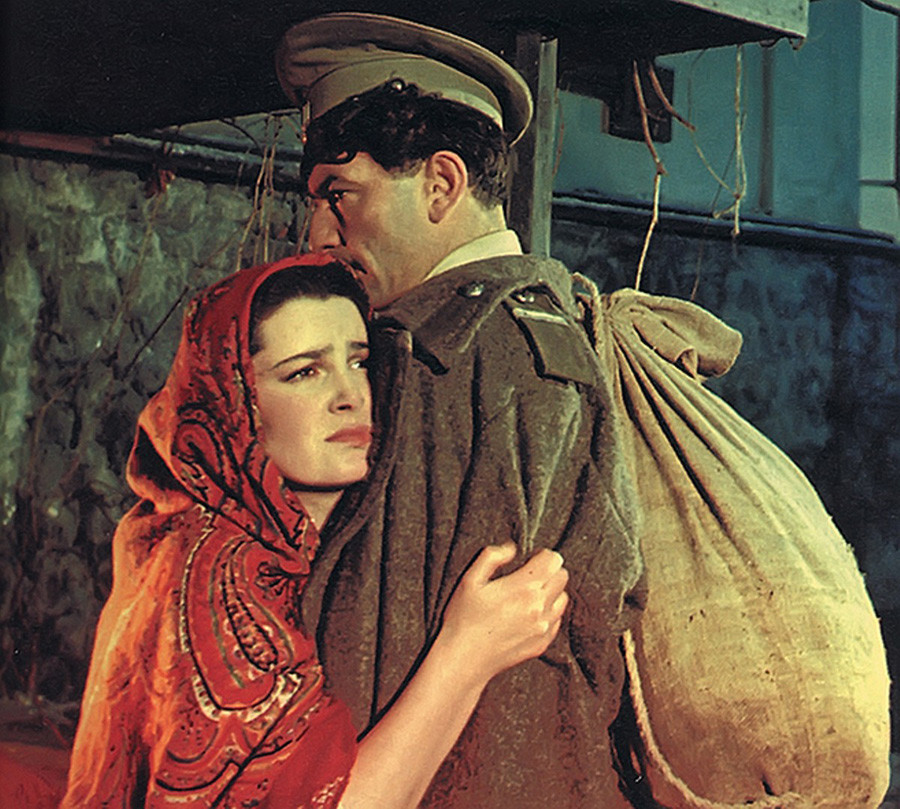
If you haven’t read Mikhail Sholokhov’s four-volume epic about the Russian Civil War, described as the War and Peace of the 20th century, then you definitely need to watch this screen adaptation of the Nobel
The October Revolution turned the lives of millions upside down. Brothers take up arms against each other, while the central character is torn between White and Red, between wife and lover. It’s all here: love, betrayal, death. Gripping stuff.
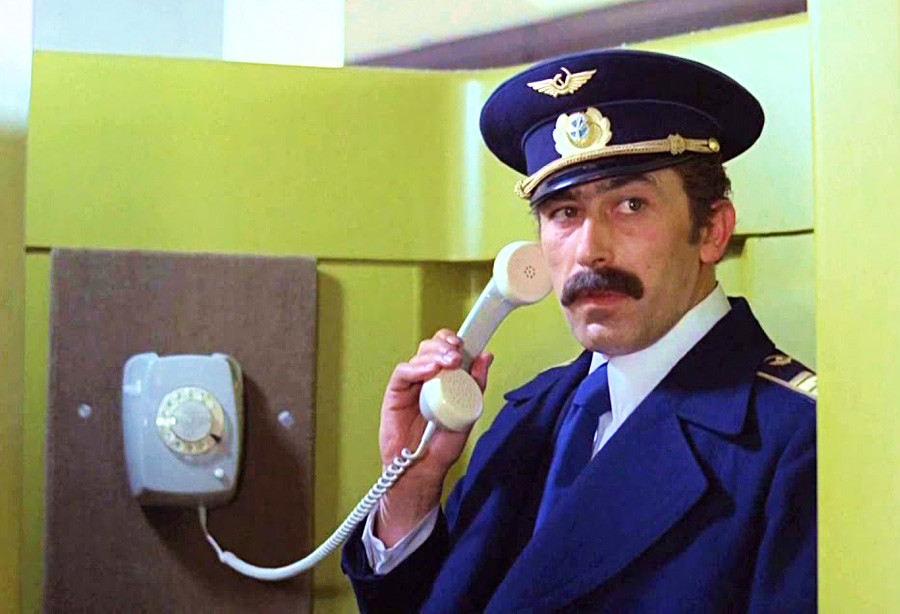
A Georgian nicknamed Mimino works as a pilot for a local airline, but dreams of flying around the world, and at the same time winning the heart of a beautiful flight attendant from the world of “big aviation.” Having fulfilled his dream, he begins to yearn for his homeland...
The charm and spice of Soviet Georgia won over the entire USSR with the stunning panoramas, local heroes, and the song “Chito
Zvyagintsev’s most recent offering bagged, inter alia, the Jury Prize at Cannes and Best Film, Best Soundtrack, and Best Cinematographer at the European Film Awards, and was nominated for an Oscar and a Golden Globe. The story concerns two separated parents in a loveless relationship, which leads to their son running away. Read more: 4 reasons to watch Loveless.
The storming of the Winter Palace by sailors in this film is often mistaken for real historical footage. Slightly embellishing reality, Eisenstein shows the overthrow of tsarist power and establishment of Bolshevik rule. It is a cinematic ode to the October Revolution, which was top of mind last year on the occasion of the 100th anniversary.
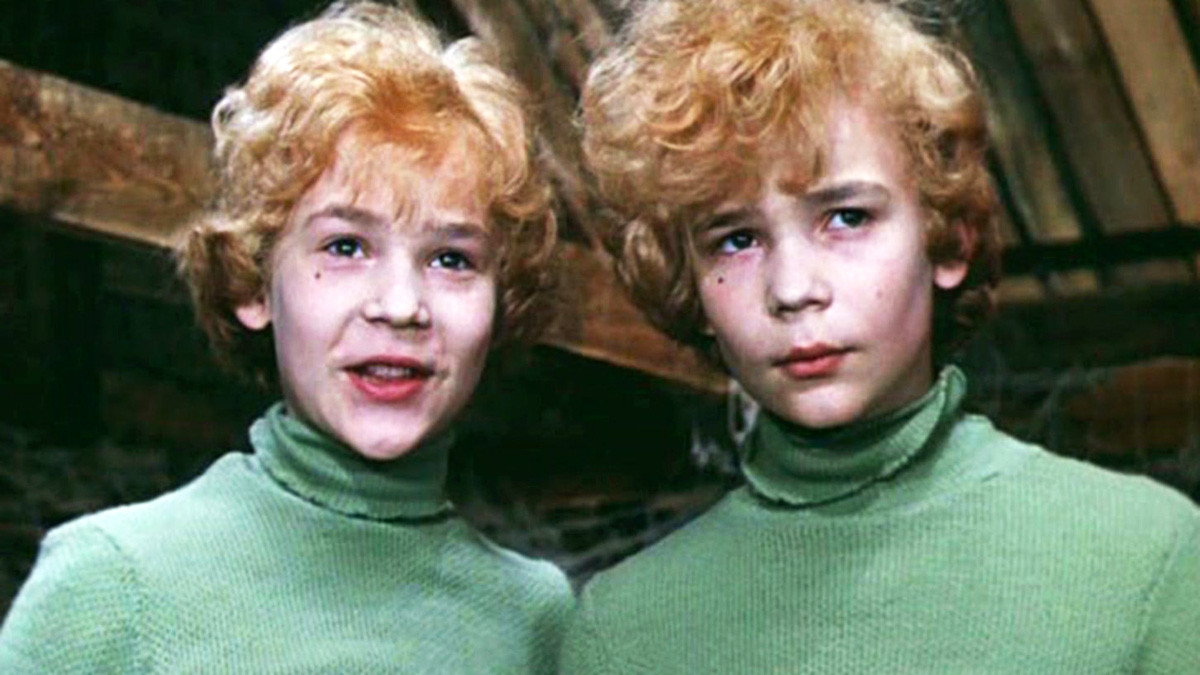
All children dream of having a twin who could sit exams for them. That is what happens to the boy Serezha Syroezhkin, only his double is a highly intelligent robot called Electronic. But finding himself in the world of people, Electronic is upset that he himself is not human.
One of the most popular children’s films, it also produced some wonderful songs—one of them, “Winged Swings,” became iconic.
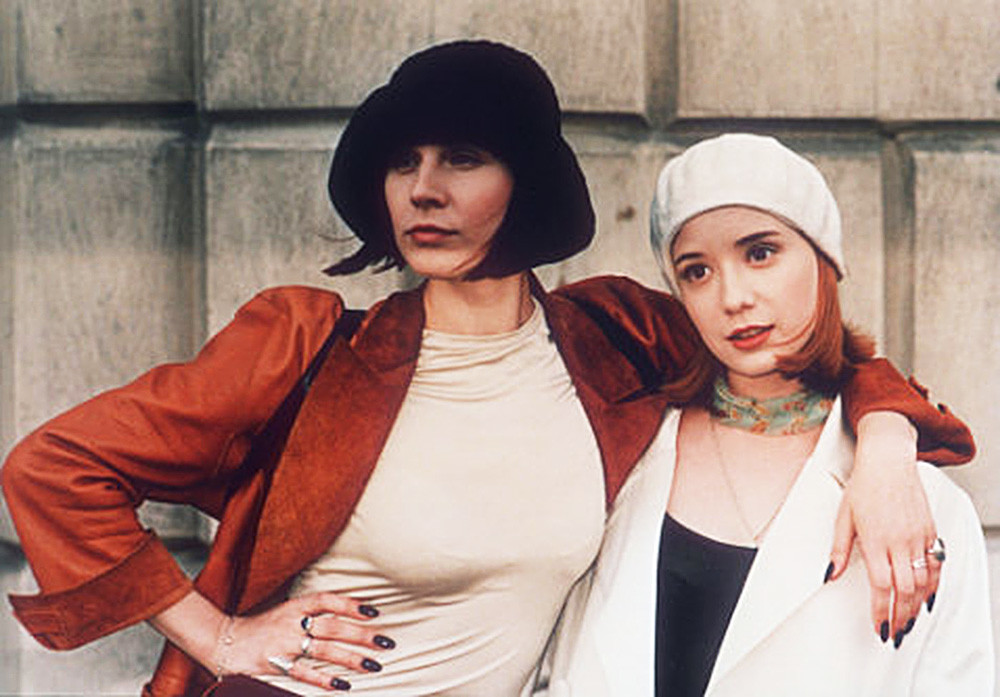
Rita’s boyfriend owes money to bandits and disappears, leaving her as collateral. She is saved and sheltered by a deaf stripper, who wants to go far, far away to the “country of the deaf,” her own private promised land...
It was one of the first (and still few) films in Russia to address the topic of disability, and won audiences’ hearts thanks to the superb acting duet of Dina Korzun and Chulpan Khamatova.
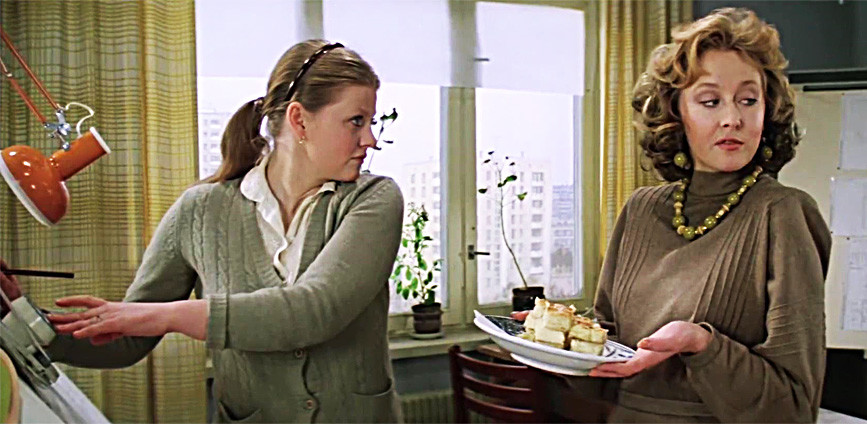
Engineer Nadia is past 30 and worried that she is not married yet. Schoolfriend Susanna decides to help her by getting hold of some fashionable outfits on the black market, and teaching her the methods of "scientific seduction." But the main thing is self-training, which involves repeating the mantra: "I am the most charming and attractive."
See for yourself how it all turns out in what is one of the most popular comedy films of the perestroika era.
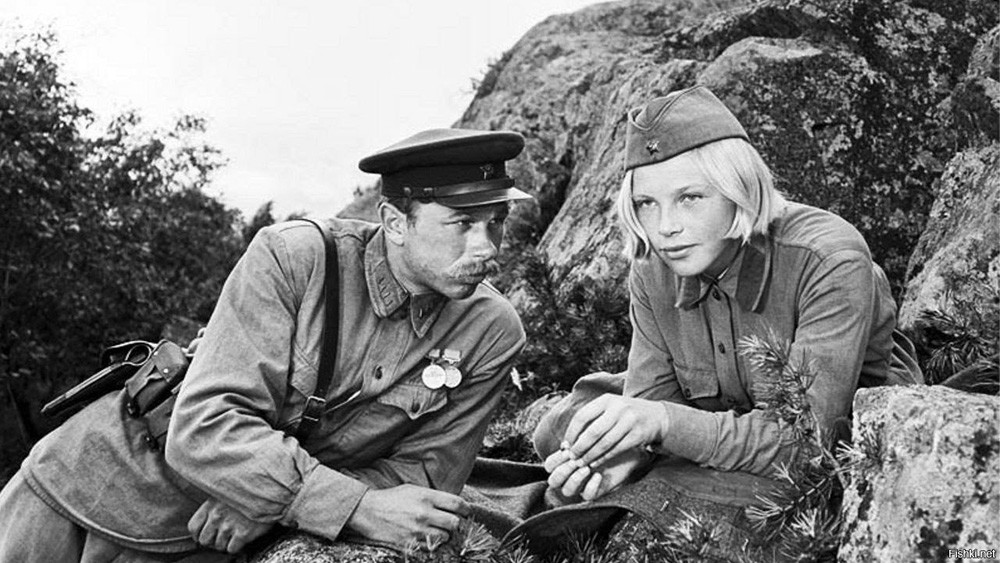
Another poignant movie about the Second World War, based on the story by Boris Vasiliev. It is the story of five young women with very different fates—all of them united by war. Under the leadership of their commander, they risk life and limb to hunt down the fascist invaders in the forests and swamps.
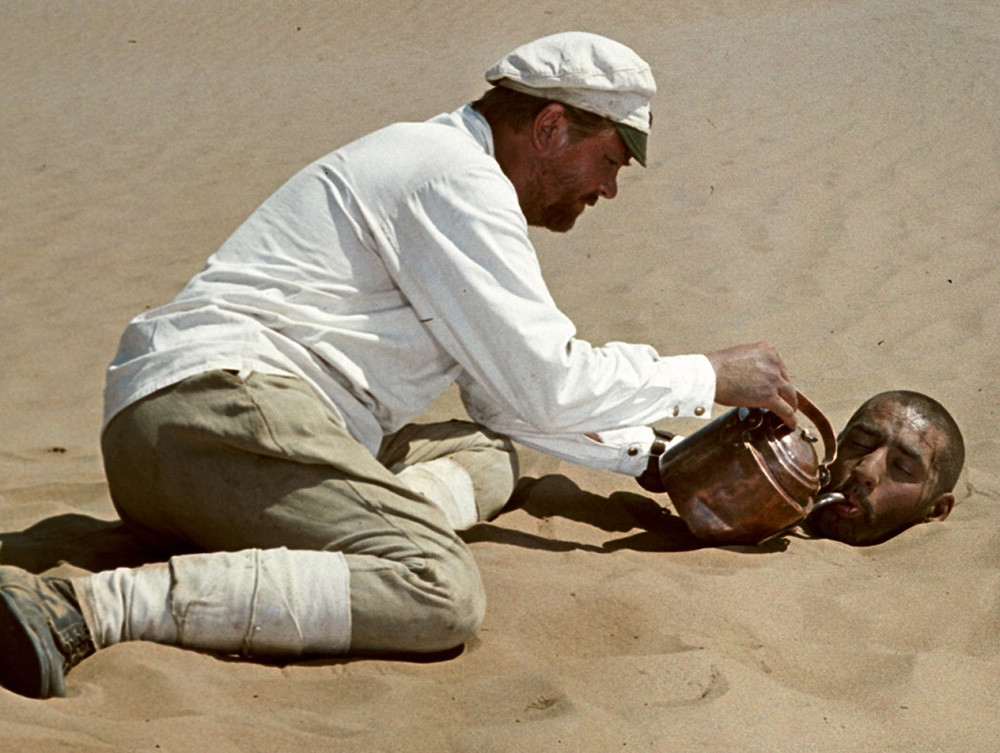
On the shores of the Caspian Sea, the Russian Civil War has just ended and Red Army soldier Sukhov is heading home to his beloved wife through the desert on foot. But one day he stumbles upon a man who has been buried up to the neck in sand by bandits. He decides to save him, together with women from the harem of another gangster.
This first “
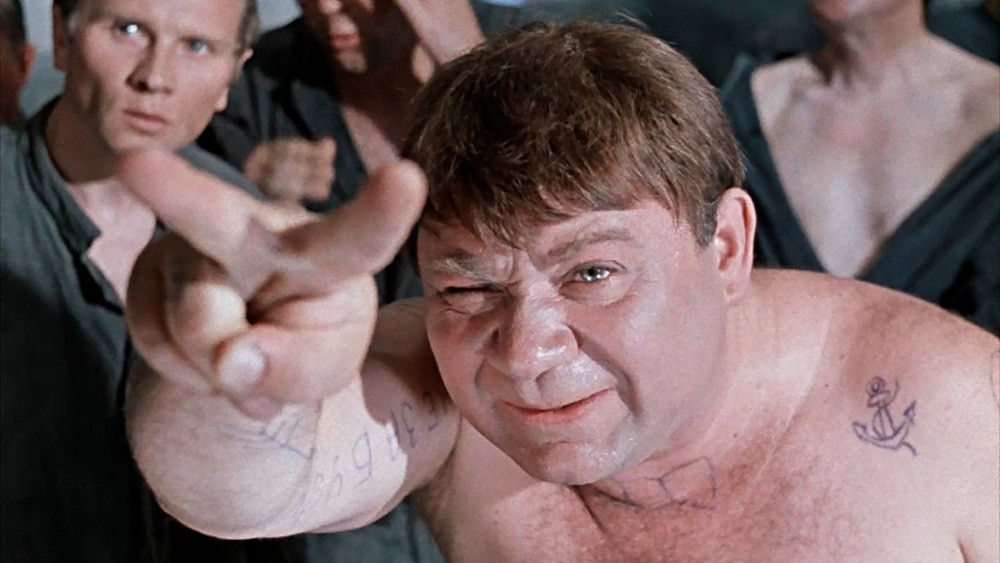
A kindergarten teacher is a dead-ringer for a dangerous gangster, so the police ask him for help in investigating the theft of Alexander the Great’s golden helmet. But to do so, the mild-mannered tutor must embed himself in a criminal gang and even arrange a jailbreak. The brilliant acting and hair-raising plot made it a box office smash.
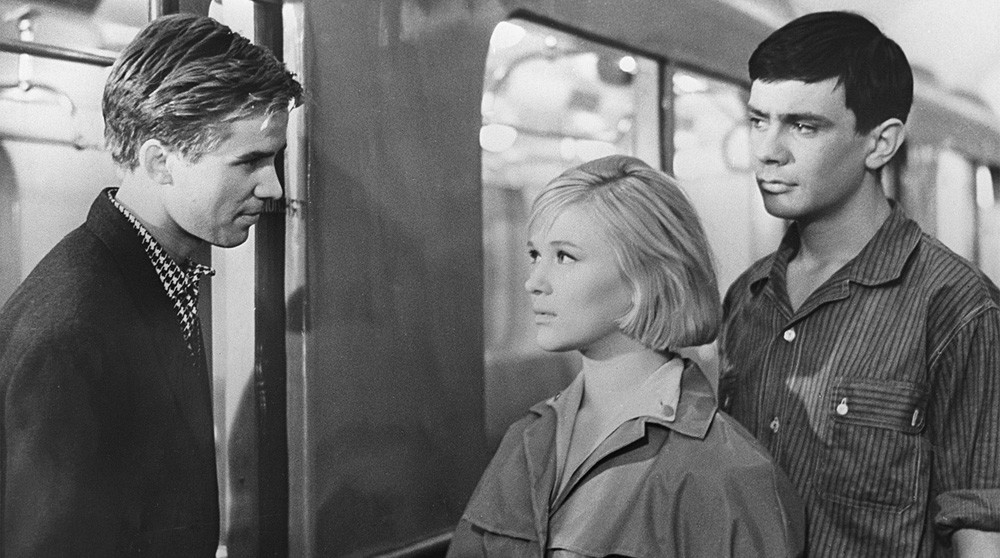
The eponymous song from the film has become almost more popular than the film itself, and is one of the most frequently performed in Russia today. The picture was born from one scene created by the screenwriter: a girl walks through the beautiful Moscow rain, while a guy rides a bicycle alongside.
The main themes are the “Khrushchev thaw” and the construction of high buildings and even higher hopes. It was also the acting debut of future Oscar-winning director Nikita Mikhalkov.
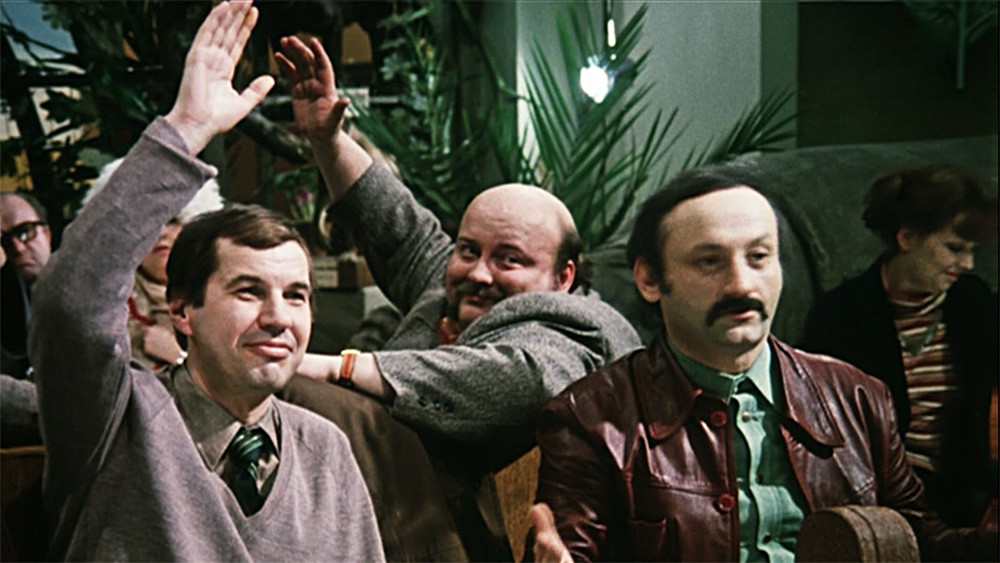
A society of garage owners meets to discuss a hot topic: some members will have to lose their garages to make way for a new road. In the midst of the fractious debate, it turns out that someone has locked the door to the room and hidden the key—everyone will have to spend the entire night under the same roof.
Filmed in just 24 days, Eldar Ryazanov’s touching comedy, based on a real-life meeting that he once attended, has become a classic.
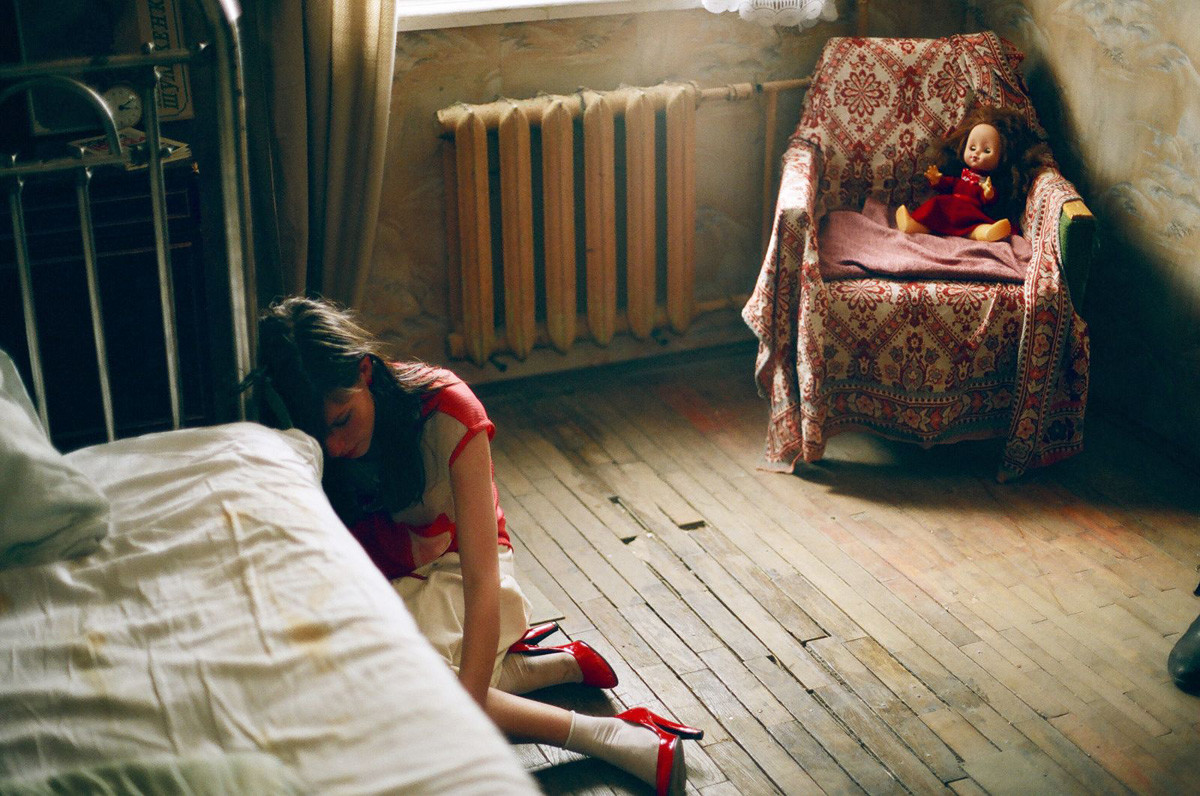
Police Captain Zhurov rapes a girl and handcuffs her to a bed. He leaves the captive’s deranged alcoholic mother to watch over her. Meanwhile, zinc coffins bearing the bodies of Soviet soldiers killed in Afghanistan are shipped back home, but there is not even any one to bury them...
The film, shown at the Venice Festival, is full of violence and corpses, made even more shocking by being based on real events. Many actors declined to take part, and some movie theaters refused to show it.
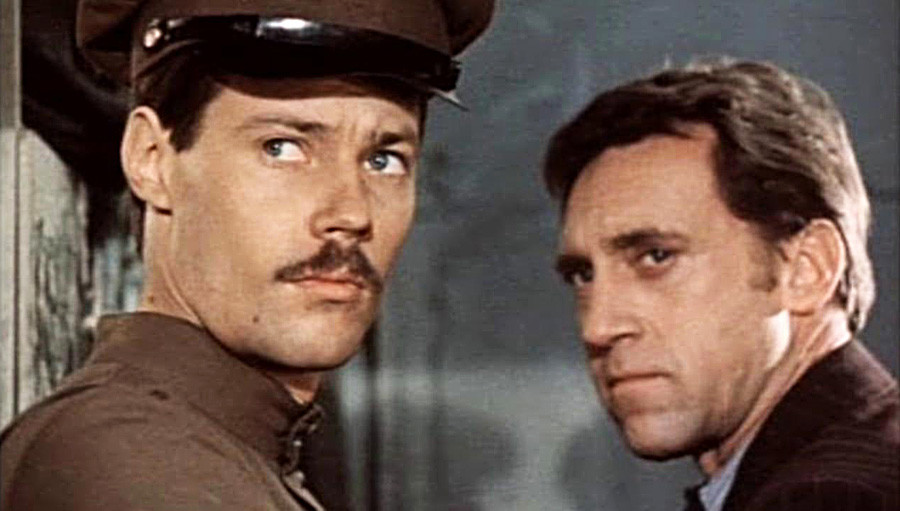
Crime in the USSR is said to have dropped during the hours that this was aired on TV. The entire country, including criminals, was glued to the screen as investigators Gleb Zheglov (played by Vladimir Vysotsky) and Vladimir Sharapov tracked down a criminal gang in the post-war Soviet Union. They were the Holmes and Watson of their day—even Sharapov’s moustache was Watson-esque.
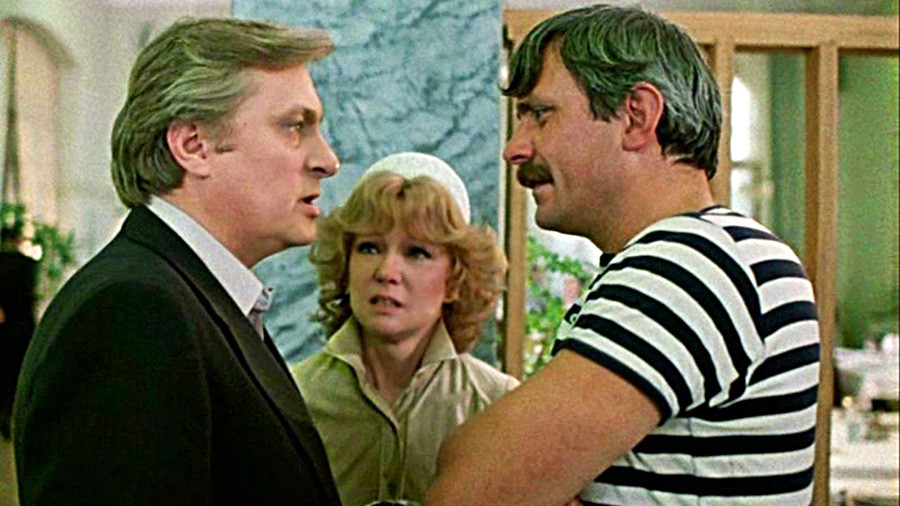
Famous actress Lyudmila Gurchenko plays an ill-mannered waitress in a cafe at a railway station. Her only love interest is a racketeer whom she meets fleetingly in a train compartment whenever he passes through. But one day a new, interesting man appears in her life when he gets stuck at the station (largely because of her). The film featured at numerous European festivals, and was warmly received at Cannes.
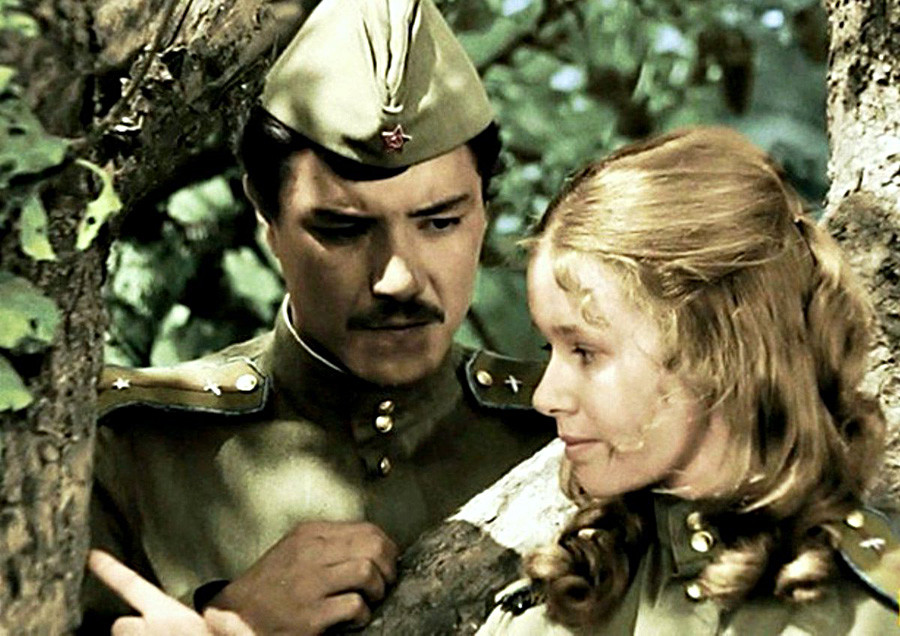
What do fighter pilots do between combat missions? Live a normal life, fall in love, wait for letters from home, and even set up an amateur orchestra. The popular, now frontline song “Smyglyanka” (“Swarthy Woman”) was performed for the first time in this film.
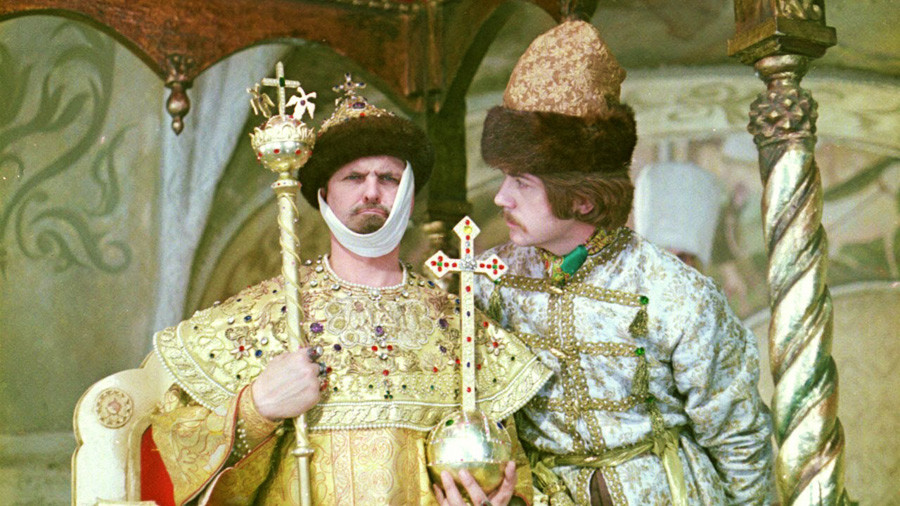
An engineer creates a time machine and accidentally brings Ivan the Terrible to the USSR. At the same time, a tsar-lookalike and a burglar robbing the apartment next door are accidentally transferred to the cut-throat Middle Ages.
The comedy is based on Mikhail Bulgakov’s little-known play Ivan Vasilyevich and, like many comic films by the legendary Gaidai, topped the box office.
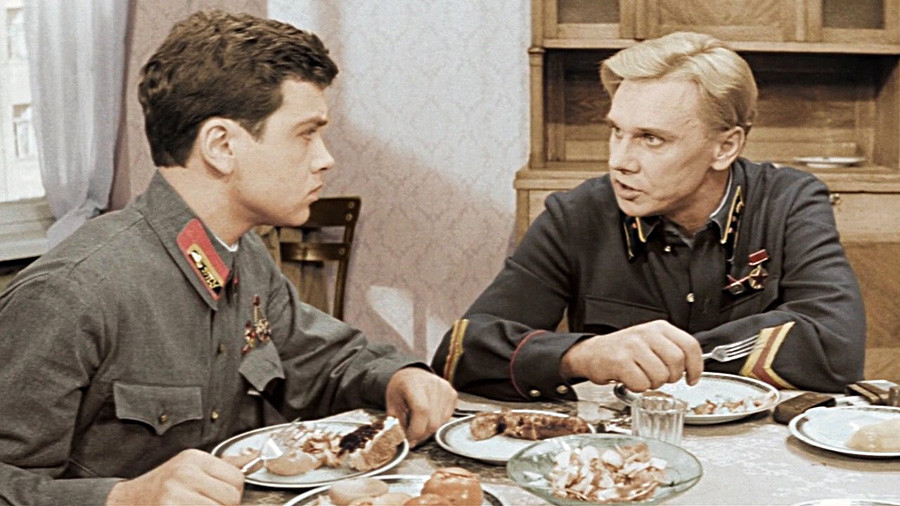
This film about ambition, duty, and love tells the story of one family in which the men of each generation all have to fight in different wars. The phrase, “Defending the Motherland is a profession,” has become a Russian proverb. In almost every Soviet family there was at least one member who served in the army, so these were not empty words for the vast majority of people.
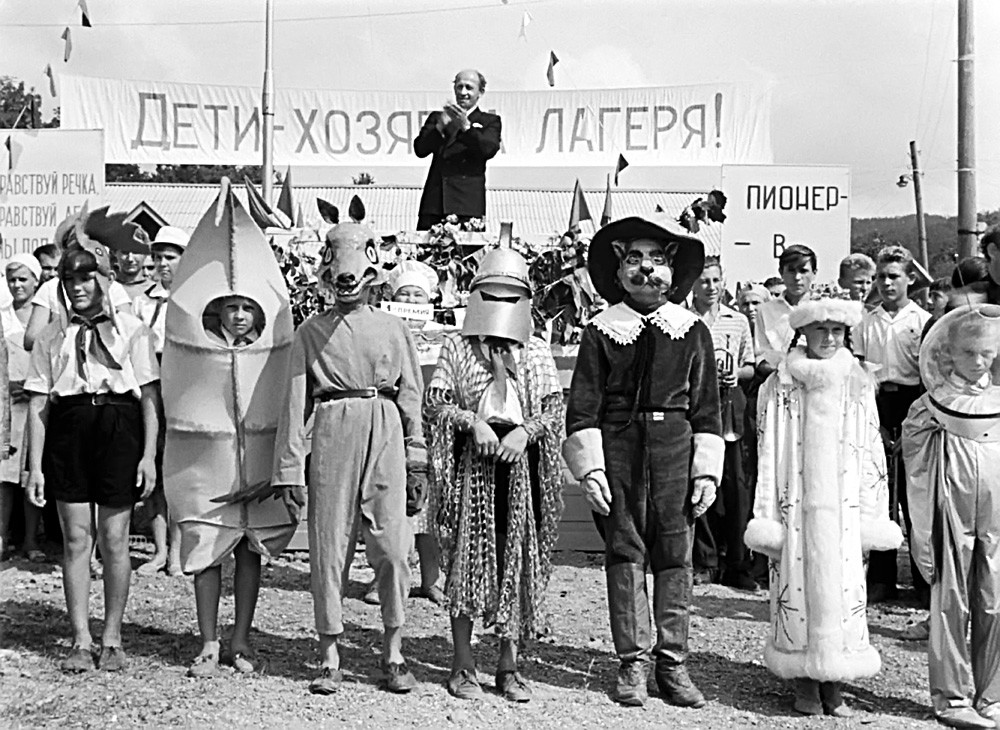
Have you ever been to a pioneer camp? Watch this movie and you will have. Playing cards behind the leaders’ backs, real friendships, and highly inventive pranks—what’s not to like? And above all, preparing for the all-important parents’ day show. A family comedy from the 1960s that has modern viewers laughing out loud.
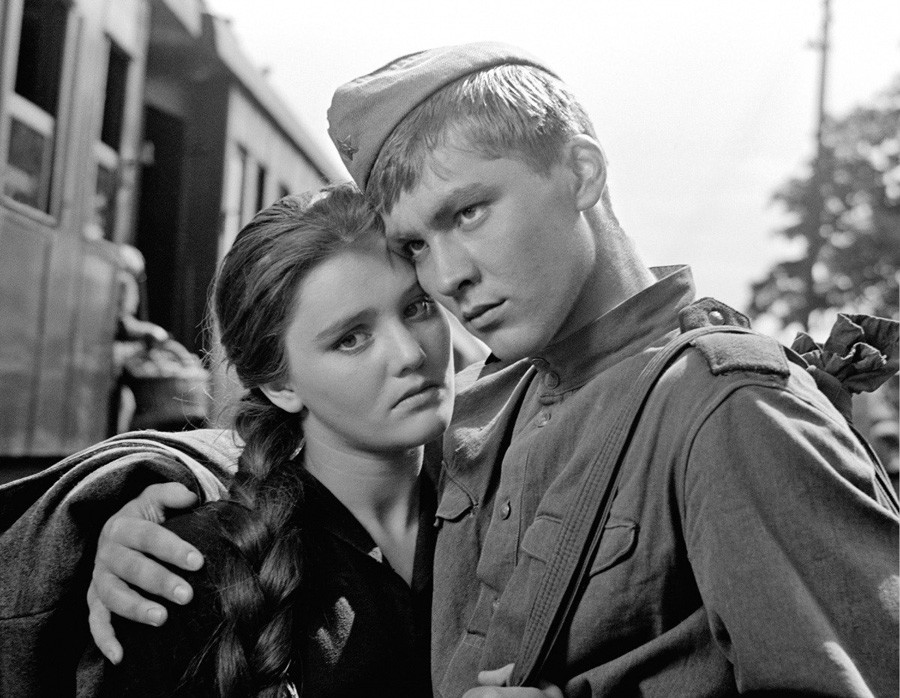
After performing a heroic deed in battle, a young soldier is granted leave to visit his mother. The journey home is long, and on the way he encounters many different people, including his first love. It takes a heart of stone not to cry when the soldier hugs his mother before his departure back to the front, neither of them knowing whether he will ever return again... Another intensely powerful WWII movie.
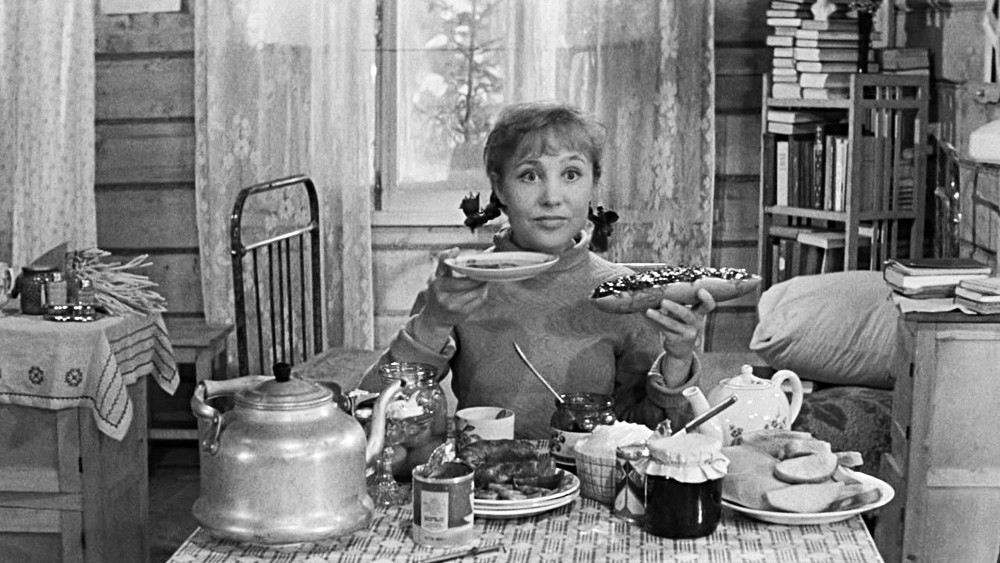
A comedy about the cook Toska, who falls in love with a ladies’ man who works at a Soviet construction site. Both are proud, so neither wants to be the first to show their feelings.
The film’s glorification of the working class and the
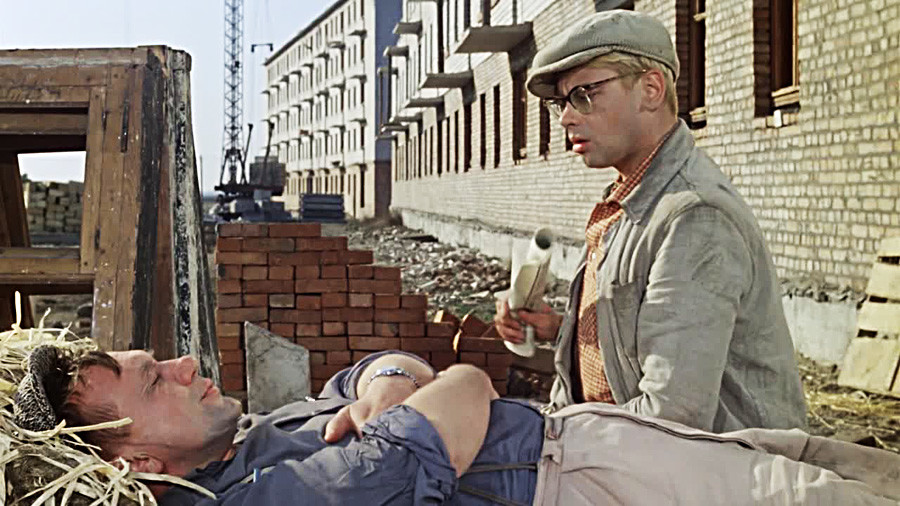
Student Shurik is forever getting into scrapes. In the first adventure, he has to confront a bully at a construction site. In the second, revising for his exams on the move, he is so engrossed in his textbook that he doesn’t notice all kinds of dangers around. And in the third, he inadvertently thwarts a gang of crooks...
Shurik was a folk hero in the USSR, the image of the exemplary student and Komsomol member. Today, Gaidai’s humor is still as sharp as ever, and even young Russians can quote from this film.
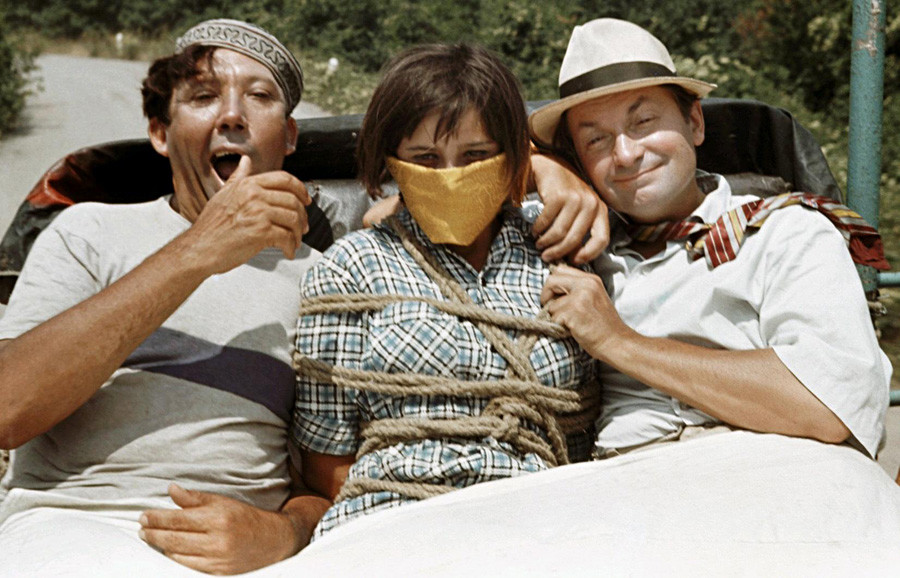
In this sequel to Operation Y, Shurik goes on an expedition to the Caucasus to learn about local customs and drinking toasts. The locals refuse to give toasts unless Shurik drinks with them, and on one occasion he is even offered to observe a highly unusual custom—bride-stealing, which turns out not to be staged.
Another beloved Soviet comedy, which gave birth to a meme about the model Soviet woman, who should be “a student, a Komsomol member, and simply beautiful.”
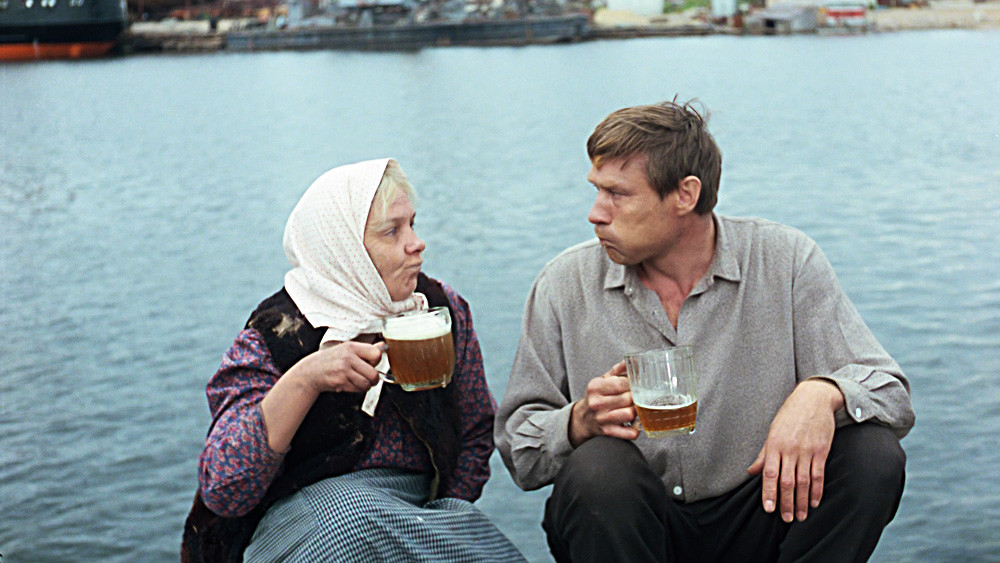
Dreaming of visiting a Russian village? Then this delightful Russian comedy for you. The wistful father of a family leaves his native village for a sanatorium, where he meets an intelligent lady charmed by his provincial straightforwardness. But outside the resort, she understands that you can take the man out of the village, but not the village out of the man.
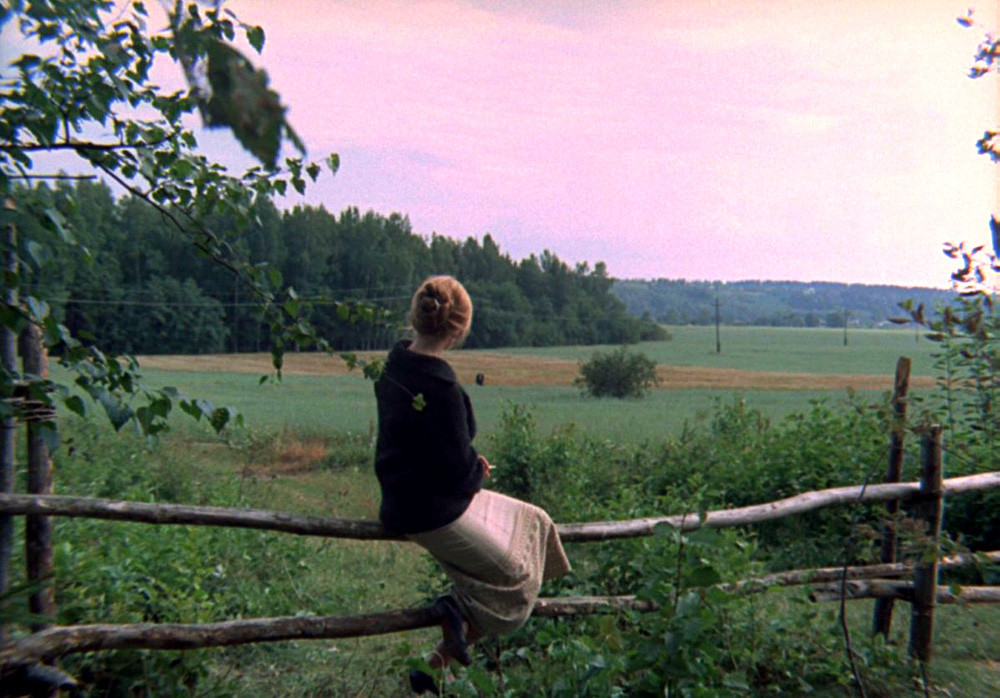
A key work in the filmography of cult director Tarkovsky, The Mirror is a stream-of-consciousness meditation on memory. In the picture, he shows fragmentary scenes from his own childhood: village home, mother, coming-of-age, war. The film incorporates poems composed and read by Soviet poet Arseny Tarkovsky, the director’s father.
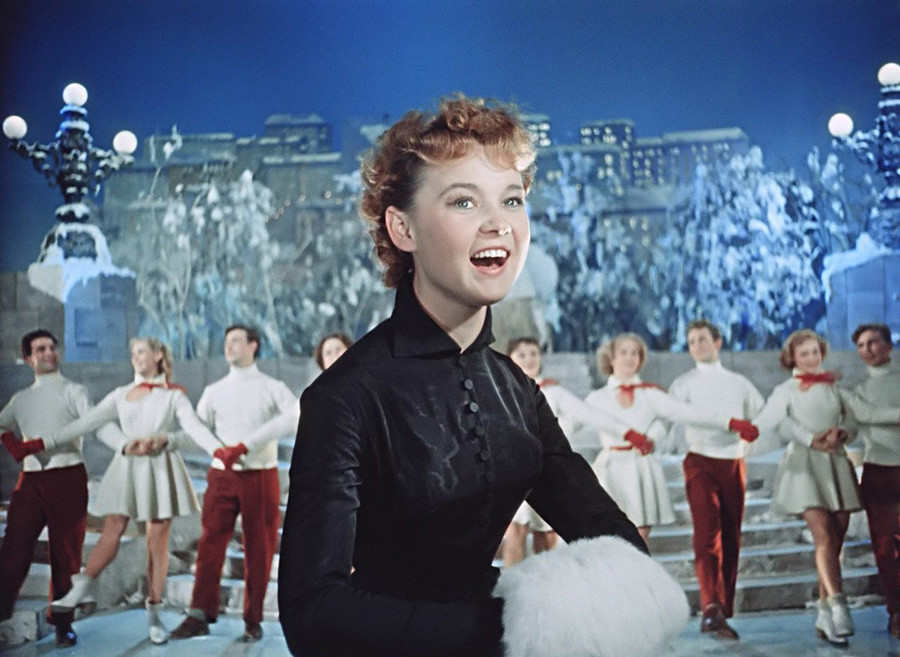
Young workers at a Soviet House of Culture rehearse for a New Year’s Eve performance, but the director wants to turn the fun and dancing into a boring official event. He has to be stopped.
The highest-grossing film of 1956 was also the movie debut of both director Eldar Ryazanov and actress Lyudmila Gurchenko. It also gave the country one of its most popular New Year songs “5 minutes.” The film was a New Year’s Eve TV regular, until replaced by the no. 1 in our list (no peeking).
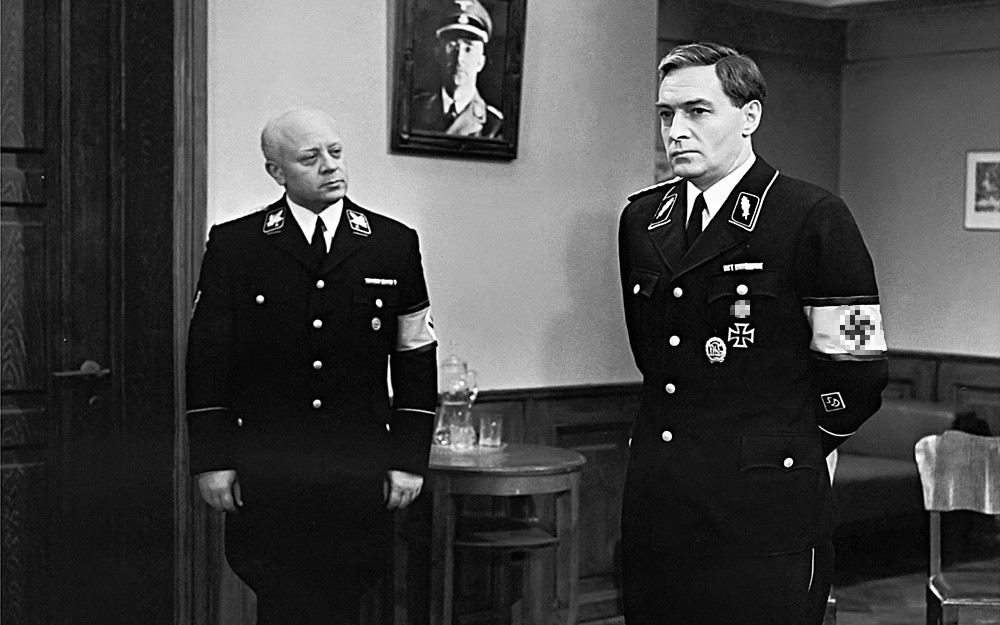
A Soviet intelligence officer penetrates the highest echelons of the SS in Nazi Germany under the name Stirlitz. The entire Soviet Union held its breath at the derring-do of the central character, and shed tears over the scene when Stirlitz encounters his wife after many years of separation, but cannot even look at her so as not to give himself away.
Stirlitz (a.k.a. the Russian James Bond) became a national hero, and his name is associated with many memes and jokes.
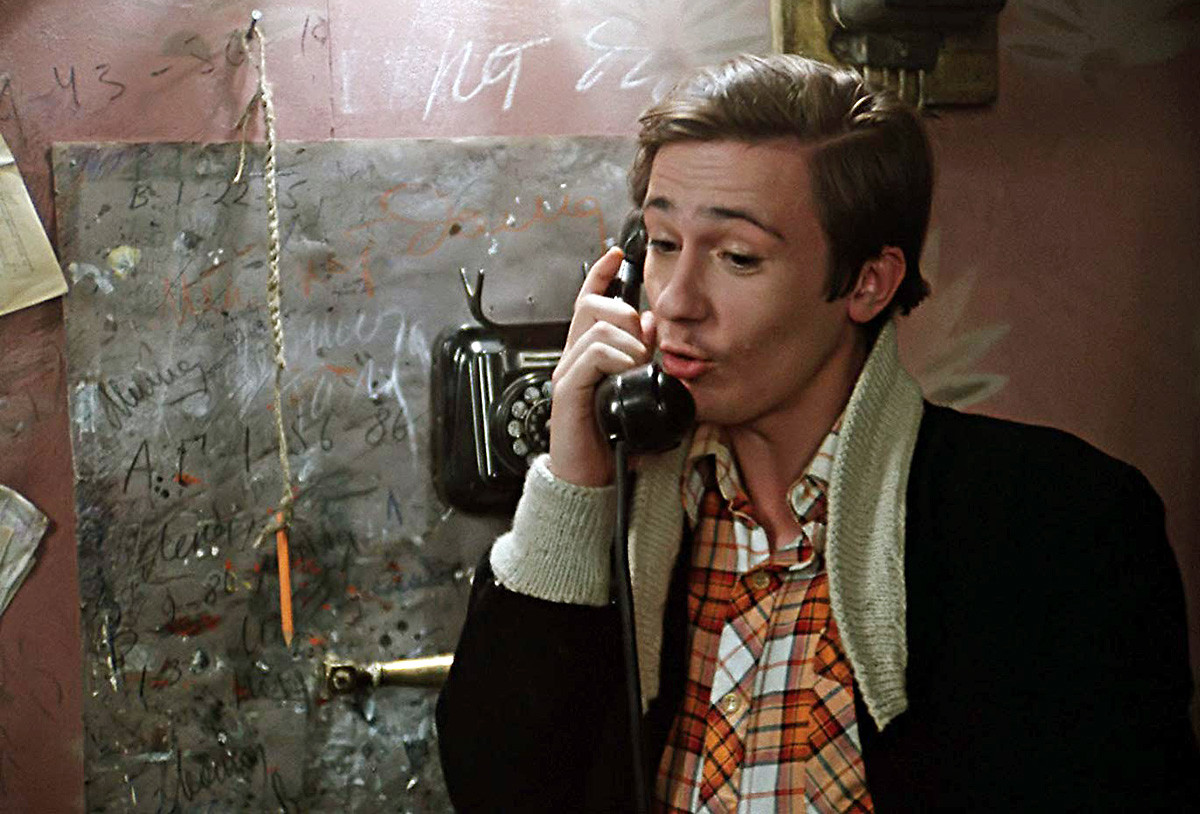
The cheerful lad Kostya arrives in Moscow to study, and stays in his aunt’s communal apartment, detonating the lives of its resident intellectuals with his nonchalance and joie de vivre... Phrases from the film have become bywords, and the comedy is something of a hymn to Moscow.
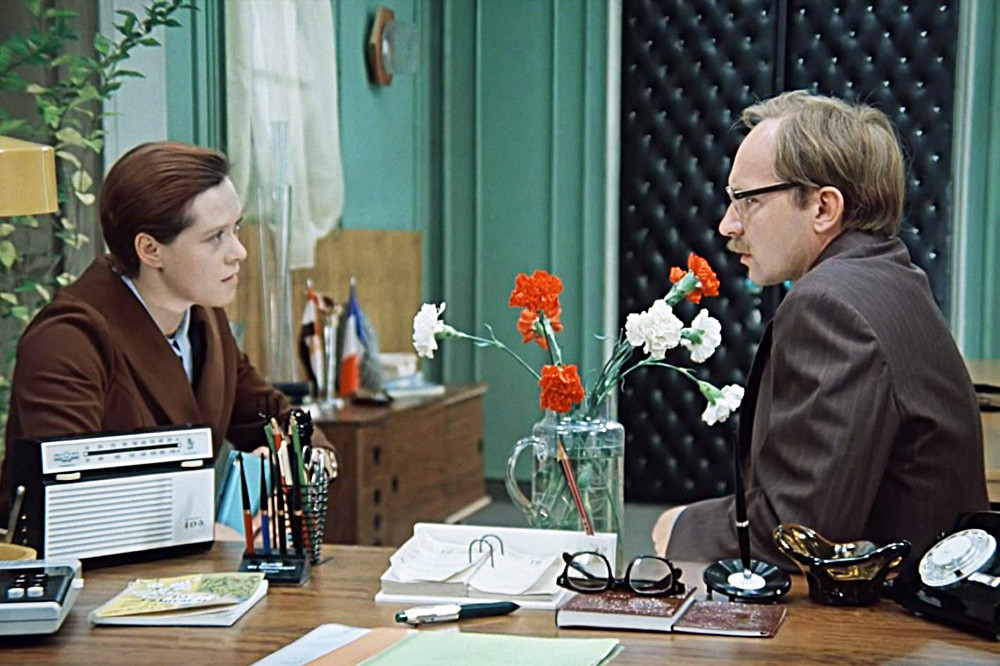
Lyudmila Prokofyevna is so accustomed to running a large enterprise with an iron fist and an unimaginative dress sense that she seems to have forgotten that she is a young, attractive, and still single woman. The intrigue starts when one of her employees asks her out for a bet, hoping to climb the career ladder, but ends up actually falling in love with his boss.
This romantic comedy about office drones topped the Soviet box office in its year of
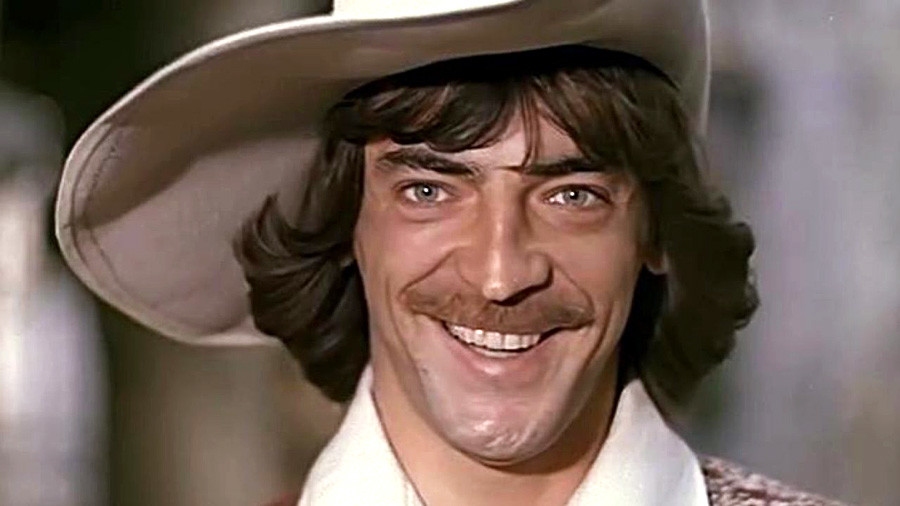
It is not clear what Soviet children loved more: the Dumas novel or this film adaptation, which turned actor Mikhail Boyarsky into the eternal image of D’Artagnan.
The three-part film features a wonderful cast and tunes that have practically become folk songs. Incidentally, to make the film look more “French,” it was shot on location in Ukraine, mainly Lviv and Odessa.
Having gone missing after the Civil War in Russia, Mitya suddenly turns up at the house of his former beloved Marusya during the terrible years of the Stalinist purges. She is now married to a Soviet officer, and does not know that her old flame has come to destroy her new one...
This multi-layered psychological drama is another Russian Oscar winner. Events unfold to the sound of the soul-wrenching tango “Tired Sun.”
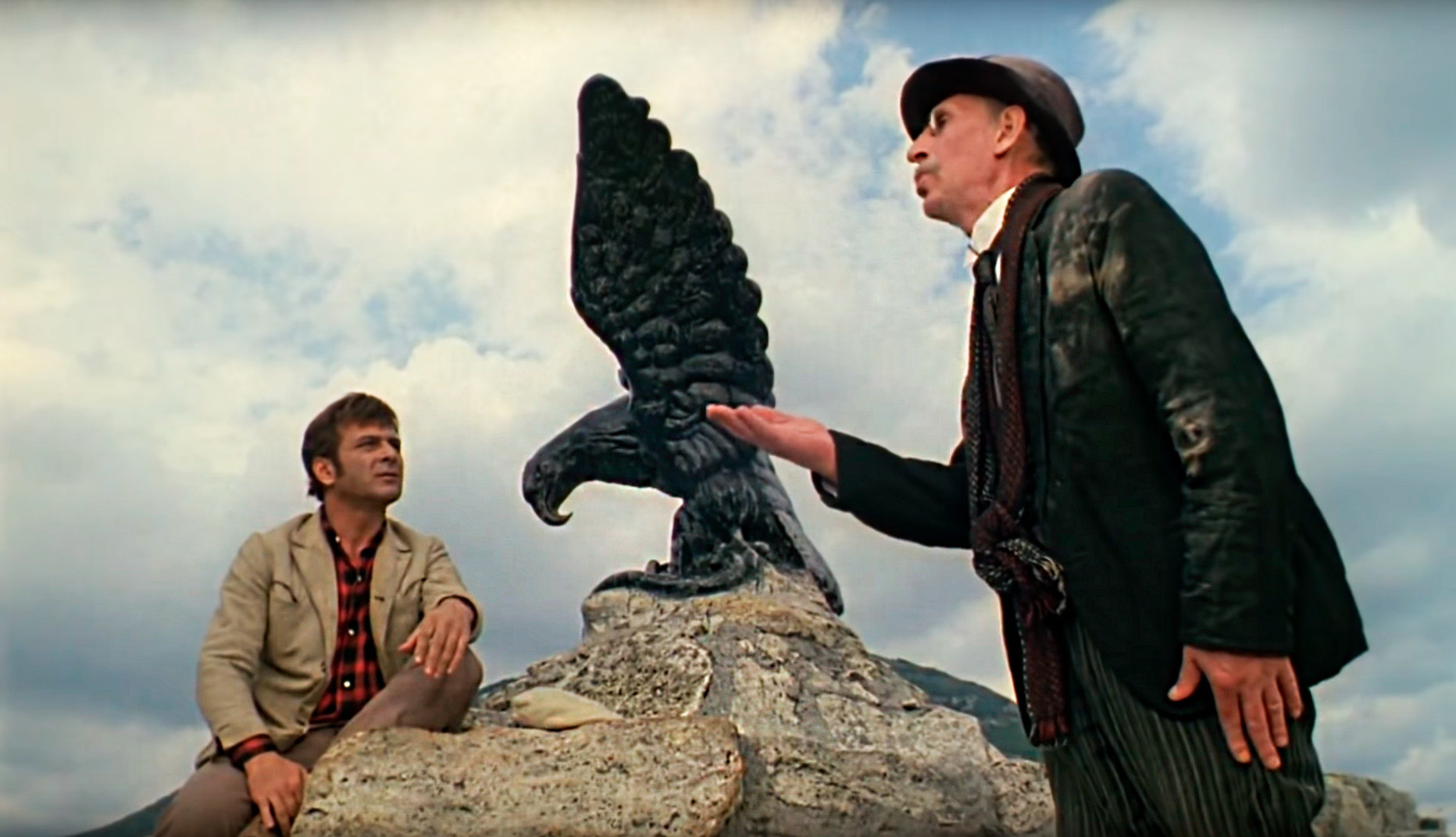
Ostap Bender, a charming conman, is searching for diamonds hidden inside an antique set of chairs by the mother-in-law of a random acquaintance just before she died. The problem is that the chairs have been sold off individually and are now spread across the country...
This screen adaptation of the comic novel by satirical co-authors Ilya Ilf and Yevgeny Petrov became an instant movie classic thanks in large part to actor Archil Gomiashvili’s brilliant portrayal of Bender, and the many memorable lines that are still quoted today.
Smugglers mistakenly place jewels in the cast of the wrong person, and then chase after the unsuspecting, respectable family man. The young Andrei Mironov woke up to nationwide fame after the premiere of this comedy. The film was seen by a then-record 76.7 million people.
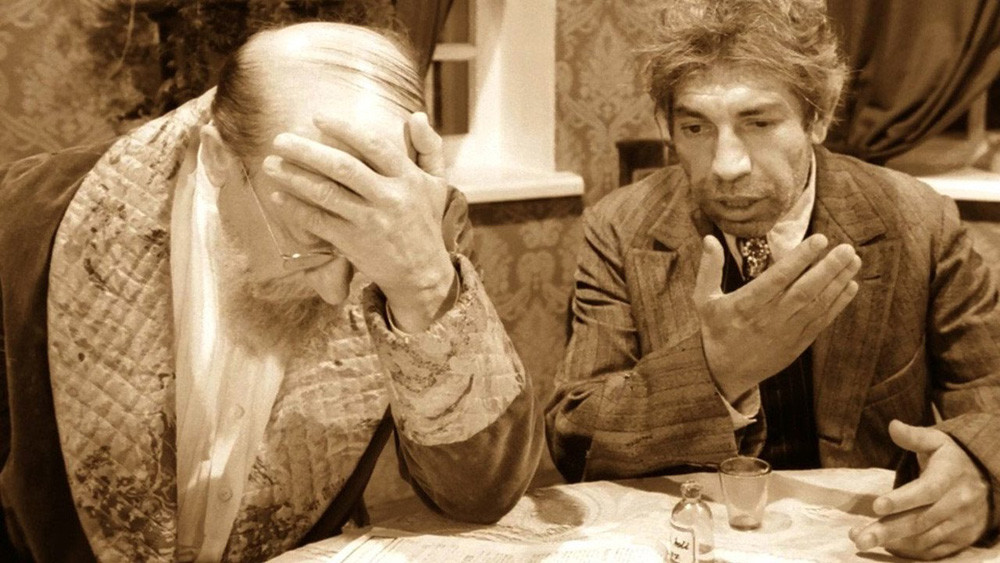
What happens if human organs are transplanted into a dog? Soviet professor Preobrazhensky decides to try. The result of this experiment, Comrade Sharikov, looks human, but behaves like a canine. Based on the popular story by Mikhail Bulgakov, the film version is just as well-loved.
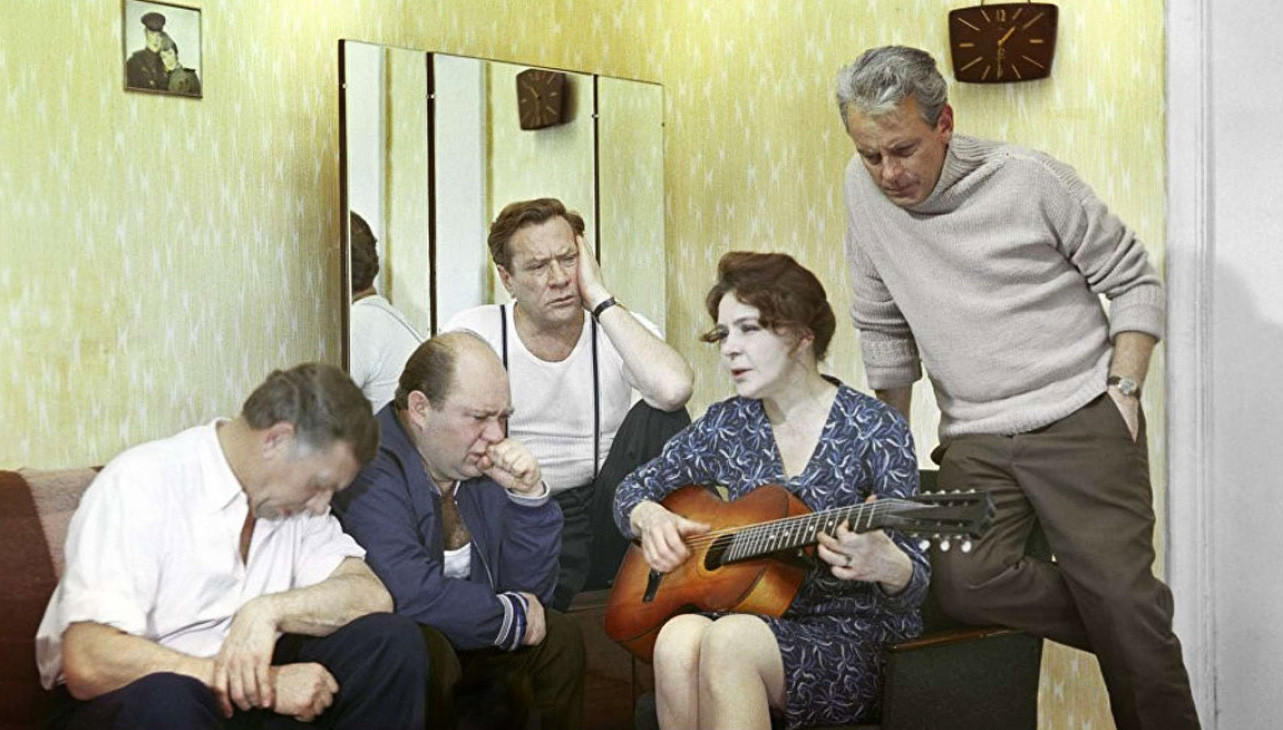
WWII comrades return from the frontline to Belorussky Station in Moscow, and each goes his own separate way. They meet again only a quarter of a century later—at the funeral of their friend. This is one of the most tear-jerking war films, in which Bulat Okudzhava’s song “We Need One Victory for All,” still popular today, sounded for the first time.
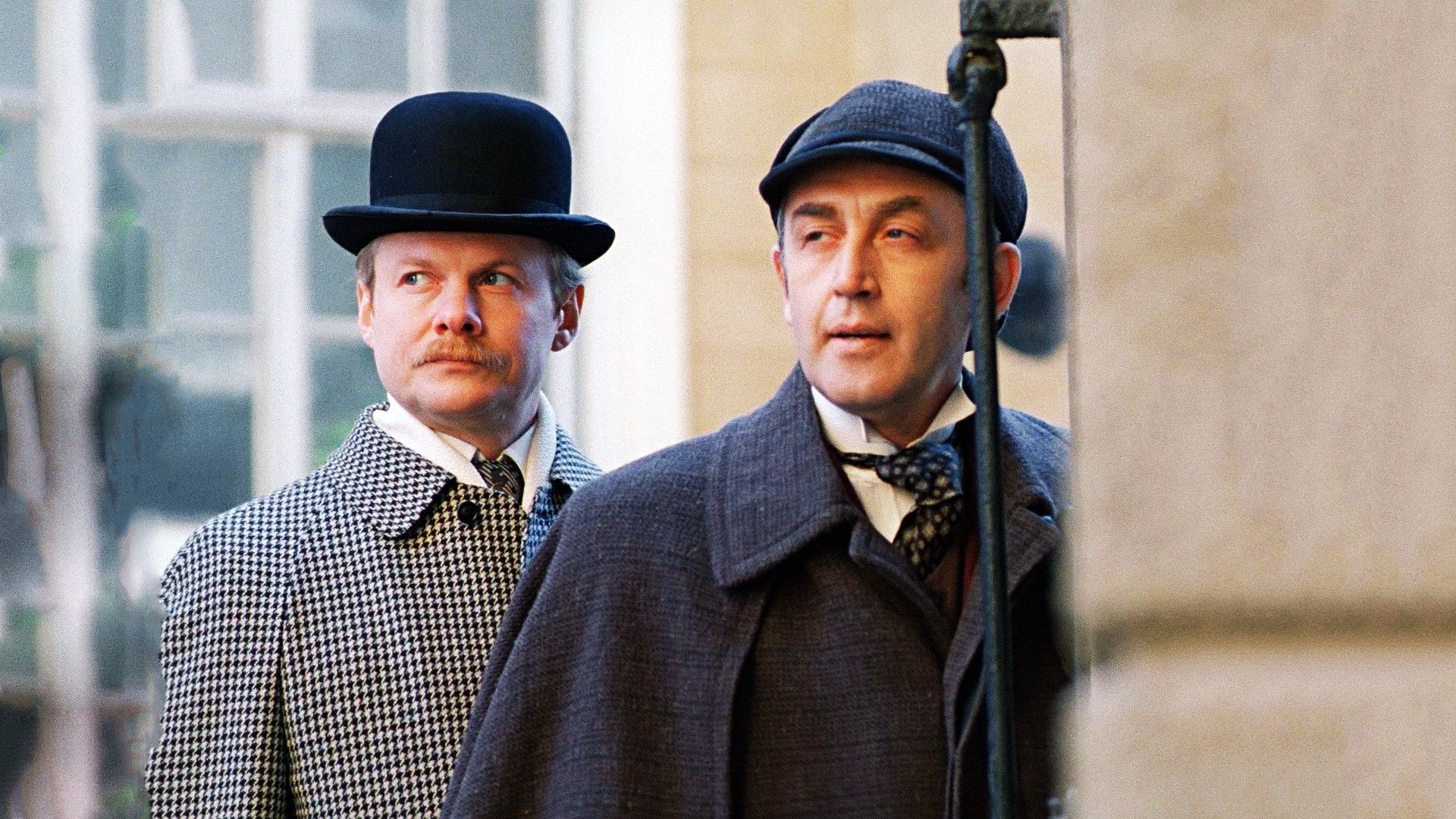
The Soviet screen version of Conan Doyle is one of the best in the world, even according to British critics. Actor Vasily Livanov was awarded the Order of the British Empire for his role as the legendary detective. A Holmes-and-Watson statue modeled on the Soviet actors was installed at the British Embassy in Moscow.
The central character, known as the Stalker, earns his living by leading people into the Zone, an area formed after the fall of a meteorite where the normal rules of reality do not apply. One day, the Professor and the Writer ask him to take them there. The Stalker agrees, but has no idea what plans these seemingly ordinary people are hatching...
This film parable is based on the sci-fi story Roadside Picnic by the Strugatsky Brothers, who also worked on the screenplay. It is one of the most popular films of this legendary director.
This philosophical cartoon for children and adults about a hedgehog who loses his way in the fog and falls into a river, but is taken to his destination by the current, is still spellbinding today. In 2003, in Tokyo, Norstein’s masterpiece was recognized as the best animated film of all time.
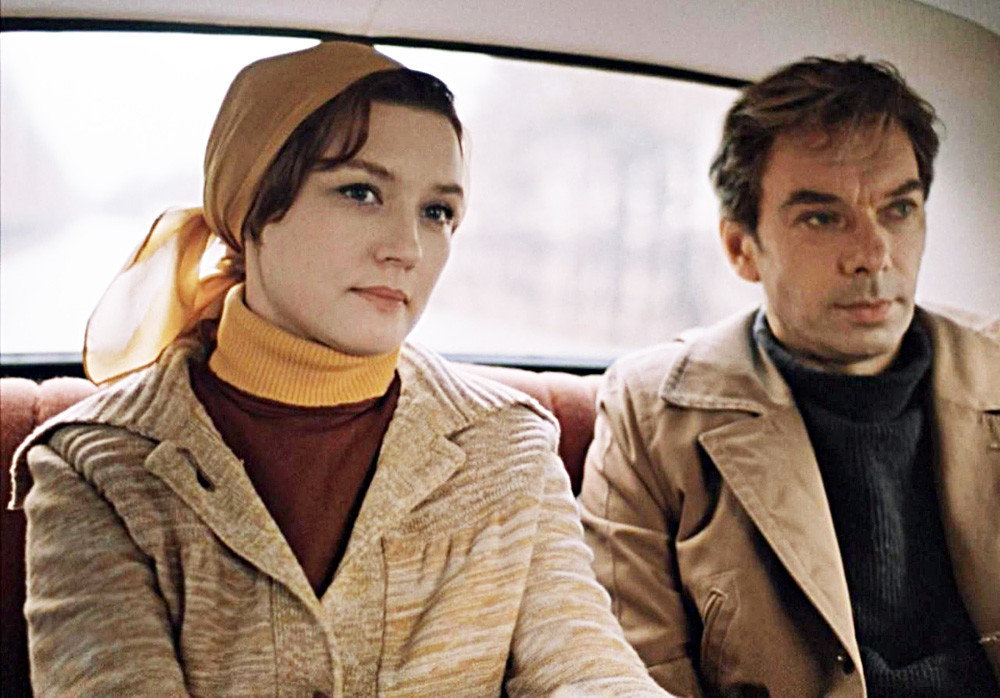
A provincial woman arrives in Moscow, pretends to be the daughter of a professor, and gets pregnant by a Muscovite from an intellectual family. The marriage having failed, she has to raise her child alone, while working and studying at the same time. Twenty years later, she becomes the director of a large enterprise...
This movie about dreams coming true picked up an Oscar for best foreign film.
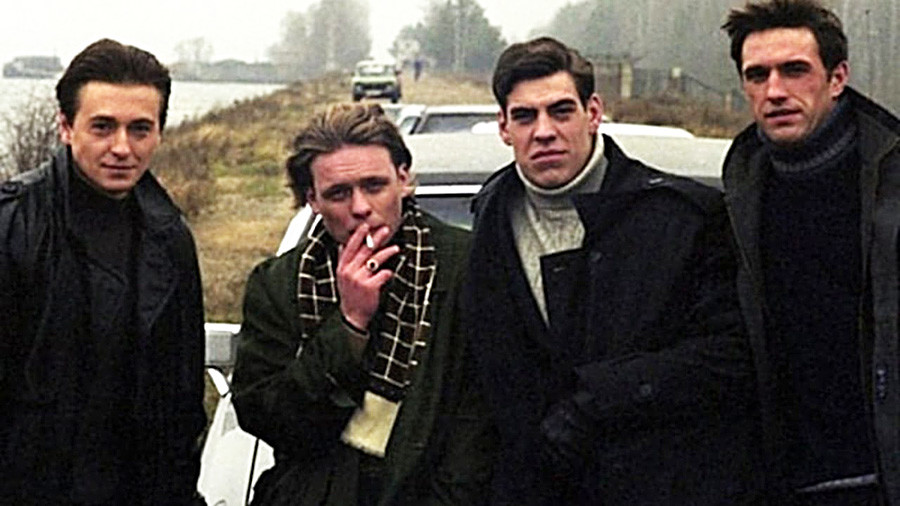
Four childhood friends looking for easy money get involved in criminal dealings. It took many more roles after this series for the leading actor, Sergey Bezrukov, to stop being associated with the gangster Sasha Bely.
Brigade is Russia’s answer to The Godfather and probably the most accurate and atmospheric series about the criminal 1990s.
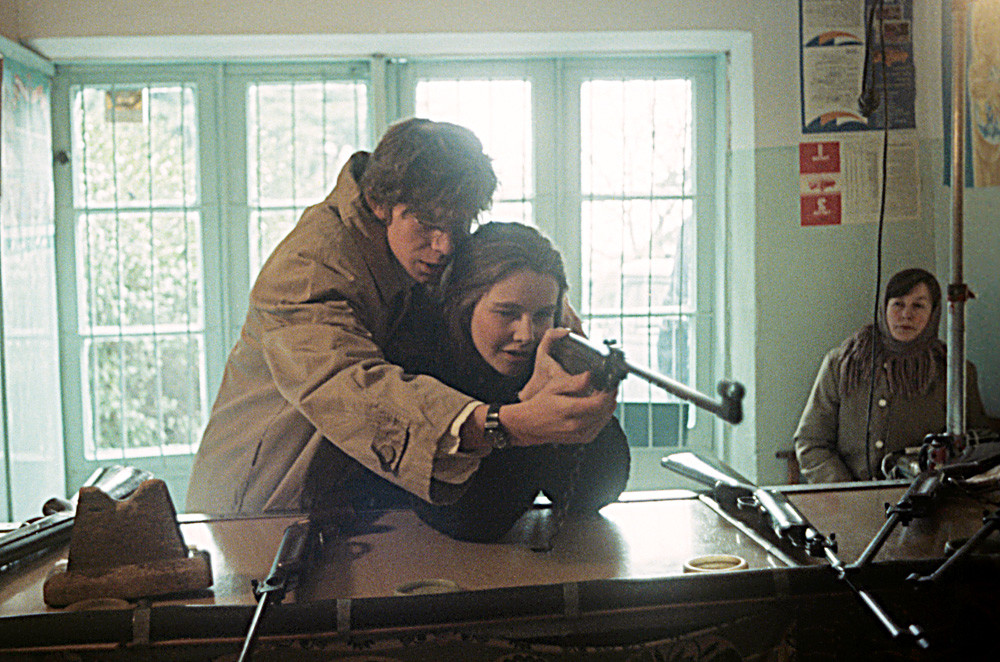
This film, about the relationship between the girlfriend of a crime boss and a musician she meets by chance, became a symbol of Gorbachev’s perestroika.
This was largely due to the soundtrack, which was recorded by various underground Soviet rock bands, including the legendary Kino and their iconic song “We Want Changes!”
Danila Bagrov, an everyday guy with strong principles, helps his brother after the latter gets embroiled with gangsters in the lawless free-for-all that was 1990s Russia. Like Assa, released ten years earlier, the film was also the soundtrack of its time, with many songs by Russia’s best rock groups.
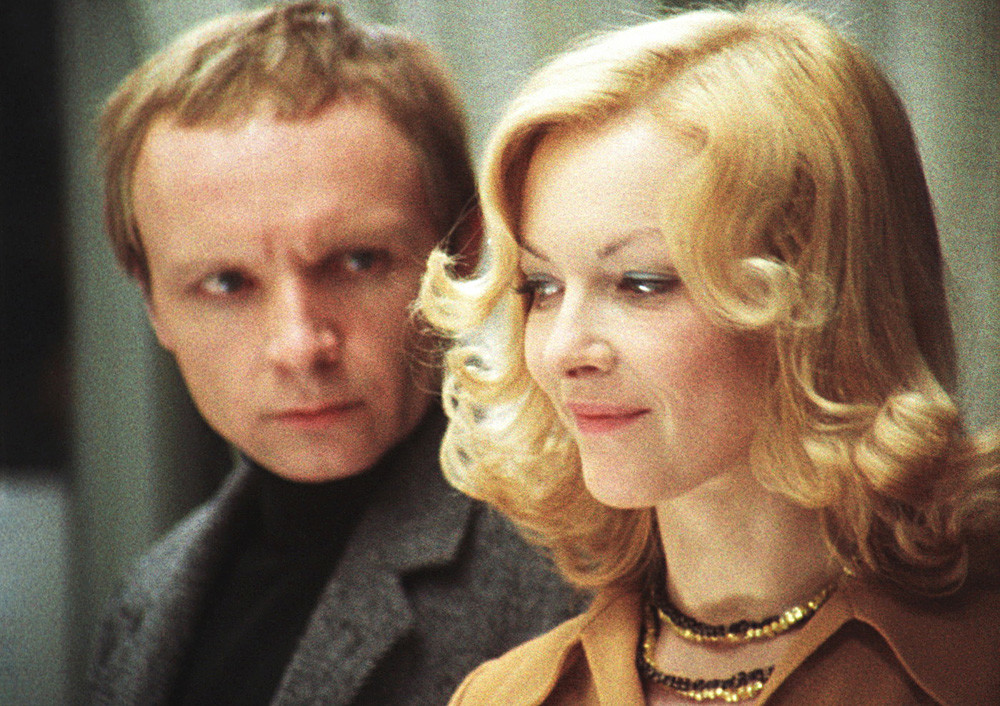
“Every year on December 31, me and my friends go to the bathhouse,” Zhenya, the likeable hero of the tale, repeats throughout the film. In Russian minds, this phrase is forever associated, besides New Year, with a situation that might (or did) go horribly, but amusingly wrong.
The film has been shown on December 31 every year without fail since its release, keeping countless people entertained while cooking and preparing for New Year. If anyone is bored of seeing it, they haven’t said so.
READ MORE: 112 Russian writers ranging from great, to absolutely freaking great
If using any of Russia Beyond's content, partly or in full, always provide an active hyperlink to the original material.
Subscribe
to our newsletter!
Get the week's best stories straight to your inbox